
美国民意大反转,“身份政治”这张牌不好打了
文章来源: 麟阁经略
02/04/2022
“身份政治”这张牌不再那么好用了
几天前,盖洛普的民调数据显示,在党派认同感上,共和党罕见地超过了民主党。
本次调查临近美国中期选举,47%的美国人现在更认同共和党,42%的人更认同民主党。无论是对选举进程,还是双方在众议院的力量对比,可能预示着一场政治地震。
更左翼的民主党,较共和党有天然的道德优势,也更受大公司、高校和媒体界的青睐。所以在历年的民调中,党派认同感普遍领先。但共和党支持者的投票率更高,因此冲抵了这种优势。
1
上一次共和党在民调上领先5%,还是在1991年。当时苏联解体+海湾战争,共和党的声望如日中天。可今天民主党的颓势,并不是共和党做出了多少成就,而是自己作死的结果。
调查显示,多数人对民主党不满的原因主要来自两点:1.通胀问题。2.削减警察局经费导致凶杀率暴增。3.强化身份政治,使中产家庭担心子女走向极端。4.以种族议题为由,要求选民在投票时不提供照片进行信息核实。
通胀问题民主党不能完全背锅,因为川普在任期尾声的两万亿美元才是开端。可即便经历了去年的“占领白宫”事件,民主党也在短短一年内迅速失去民心,可见“身份政治”这张牌已不再好打。
在选民成分中,黑人族裔一边倒支持民主党。而在“投票不核实照片”的政议下,遭到83%的拉丁裔反对,这使大量白人和拉丁裔转投共和党。美国两党选民在族裔上的泾渭分明,堪比南北战争时期,说明民主党的“身份政治”没有带来族裔间的和谐,反而更撕裂了社会。

2020年5月弗洛伊德事件中,美国各州示威者将矛头对准警局,要求削减警察经费。当时临近大选,民主党将此事上升至种族议题,获得大量支持。随后,民主党优势的各城市议会纷纷表决通过削减警察预算。纽约打算从56亿美元的预算中削减10亿;洛杉矶从18.6亿预算中削减1.5亿;首都华盛顿削减1500万。
旧金山,奥斯汀,奥克兰,西雅图,巴尔的摩,费城……众多知名城市争先恐后加入进来。弗洛伊德事件发生地明尼阿波利斯市议会甚至通过议案,决定彻底取消警察局。
这样做的后果并不是更少的歧视与暴力,相反,2020年美国凶杀案的发生率同比激增了30%,出现“历史性的增长”,而2021年也并无好转,甚至更糟。而凶杀案的增加主要集中在这些削减经费的大城市…….
2
说到这里,请大家思考两个问题:1.身份政治是缓和了种族矛盾,还是加剧了种族歧视?2.身份政治下,黑人是否真的受益?
如果你在美国做手术,你会发现这行几乎没有黑人。为什么?因为平权法案之下,黑人拿到学位的门槛,要比其他族裔低得多。平时白左可以靠放放嘴炮支持一下黑人,但一到要给自己开刀,身体立刻诚实。
这种现象几乎出现在美国各行各业,凡是黑人比例低的行业,左翼总是要振臂一呼,要求平权。可是决定雇佣关系的是市场,强行平权的结果大家嘴上不说,而心里有杆秤。

(靠炒作种族议题上位的新《星战》3部曲芬恩演员称:自己戏份与白人演员相差太多,迪士尼存在种族歧视)
这让真正努力的黑人,变成了全社会心照不宣的“作弊者”,反而受到了更深层的歧视。歧视,美国最反感种族议题的,是黑人里面的精英,因为这些法律、医生、金融从业者更难得到劳动市场的认可。
说句常识:改善一个族裔的生活状况,不是靠发福利来完成的,关键的是就业率。我认识的华人老板都不雇佣黑人,不是因为歧视,而是黑人磨洋工的概率远比其他族裔高,但凡老板反应激烈一点,很容易被冠以“歧视”的骂名,在社区社死。
当一个人靠吵闹和道德绑架,就能获得比辛勤劳动更多的好处时,傻子才会敬业。这就是为什么到今天黑人还是给人留下懒散的刻板影响,身份政治没有减少歧视,而是加剧了歧视。
非常讽刺的事实是,当弗洛伊德事件被上升到种族问题上,不断放大。最终受害的居然是黑人!想想看,当警察系统瘫痪,凶杀率激增时,谁最容易受到伤害?
数据显示,在2020年被害人中,至少有9913名黑人,这高于其他族裔总和(美国黑人人口占比仅13%)。白人、亚裔的社区治安水平要比黑人社区好得多,黑人成为了削减警察经费的主要受害者!
有些人过嘴炮的瘾,是用别人的生命来支付的。每次遇到搞不清事实,动辄拿“美国黑人黑警察强杀率远高于白人”说事,希望打压治安系统的左翼,我都会建议他去黑人社区实地调研一下。
黑人社区最显著的现象,就是极度的经济凋敝,没有人敢在这里开店。我问过一个纽约的警察,他说自己巡逻能不路过黑人社区,就尽量远离。美国黑人更容易被搜身和枪击是事实,但根本的原因不是肤色,而是背后的犯罪率和吸毒率。13%的黑人,贡献了美国一半以上的犯罪。
如果我是遵纪守法的黑人,我一定希望美国警察越多越好。黑人的犯罪率一旦大幅下降,黑人绝对是真正的受益者,当人不再为性命担忧的时候,他才有动机考虑前程!
我很同意秦晖老师的观点:阶级问题是最小的问题。穷人和富人没有绝对的身份界限,可以通过工作和财富分配来转换。可种族问题就不一样了,种族这个东西没法靠转换来实现和解。
所以,要让种族间实现和解。最好的解法是关注“穷人”和“富人”的问题,而不是把什么事都要上升到难以调节的“种族议题”上。黑富人的社会地位要比穷白人高得多,阶级的跃迁才是消除歧视的正道。
而身份政治,正在破坏社会的公平,让阶级跃迁变得愈发困难。
民调敲响警钟!美国恐面临政治地震
来源:FX168
01/27/2022
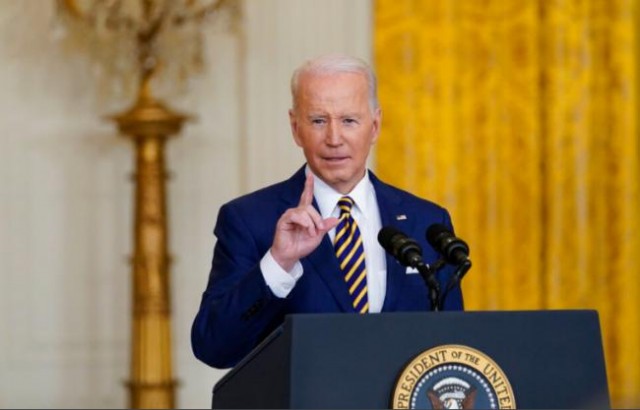
日前,盖洛普的民调显示,2021年共和党人罕见地在政党认同方面领先于民主党,与此同时,拜登的支持率也出现下滑,美媒评论称,可能预示着一场政治地震的到来。
《纽约时报》周二的一篇特邀文章预测,拜登总统可能会把民主党拖入一场“政治地震”。此前一项民调发现,2021年,认为自己是共和党的美国人比认为自己是民主党的人多,这是几十年来的首次。
与前一年相比,民主党人在2021年的受欢迎程度有很大差异,该文章的作者Christopher Caldwell认为拜登是部分原因。盖洛普(Gallup)发现,在美国的政党偏好方面,共和党人的表现优于民主党人,共和党的支持率为47%,高于民主党的42%。
共和党人很少在政党认同方面居于领先地位,即使他们在其他方面都成绩骄人。
“自1991年盖洛普开始统计政党认同以来,民主党人平均领先4个百分点,”Caldwell说。
1991年适逢伊拉克战争爆发,那一年共和党领先了民主党。但1991年之后,即使共和党在中期选举中取得胜利,例如2001年发生九一一恐袭和奥巴马任内八年推动了不受欢迎的医改法案,共和党在政党认同方面都是落后于民主党或只能做到持平。
在2016年至2020年,民主党的领先优势扩大至五、六个百分点。去年拜登击败川普成为总统时,民主党和共和党比数为49比40。原本领先九个百分点的民主党,在不到一年里竟落后五个百分点,这是盖洛普录得的最大政党命运反转数据。
拜登似乎与民主党同时失去了人气。昆尼皮亚克大学1月份的一项民意调查发现,拜登的支持率为33%,大多数美国人对总统处理新冠肺炎、外交政策和经济的方式感到失望。
该调查反映了历史性的通货膨胀、从阿富汗撤军,以及拜登未能像他在2020年竞选期间承诺的那样“消灭病毒”。
另外,数据分析网站FiveThirtyEight对拜登本身的支持率进行的分析显示拜登的支持率同样下滑。
拜登初上任时的支持率为55%,超越了里根、克林顿、布什,但现在拜登的支持率已下跌到42%,其上任首年的支持率与二战后14位美国总统首年任期的支持率相比,拜登的得分是历来第二低,只稍胜于其前任川普。
Caldwell说,拜登在亚特兰大发表的广受批评的讲话,把那些反对他的选举改革议程的人比作美国历史上受人唾骂的人物,在政治上对民主党人是有害的。
“当……拜登本月在亚特兰大对群众表示,那些反对这项法案的人与阿拉巴马州的种族隔离主义者州长George Wallace和南部邦联“总统”Jefferson Davis站在同一阵线时,他可以说是将希拉里·克林顿(Hillary Clinton)在2016年发表的“可叹之人”(deplorables)言论中的傲慢态度与一种反白人的种族煽动相结合。这在选举上是危险的,”Caldwell写道。
Caldwell说,美国人不相信民主党人的说法。
“大约自2020年5月乔治·弗洛伊德被杀以来,民主党人一直在讲述一个关于这个国家太过关注种族、太过关注唐纳德·川普的故事,”他写道,“民主党人已经被他们对川普的痴迷引入歧途。他们误解了这位前总统对投票的美国人意味着什么……川普利用了人们对各种信息经济精英和管理者的不满情绪。少数族裔选民没有理由不分享他们的一些不满。”
影/忘记麦克风没关?拜登骂福斯记者「愚蠢的王八蛋」
世界新闻网
01/25/2022
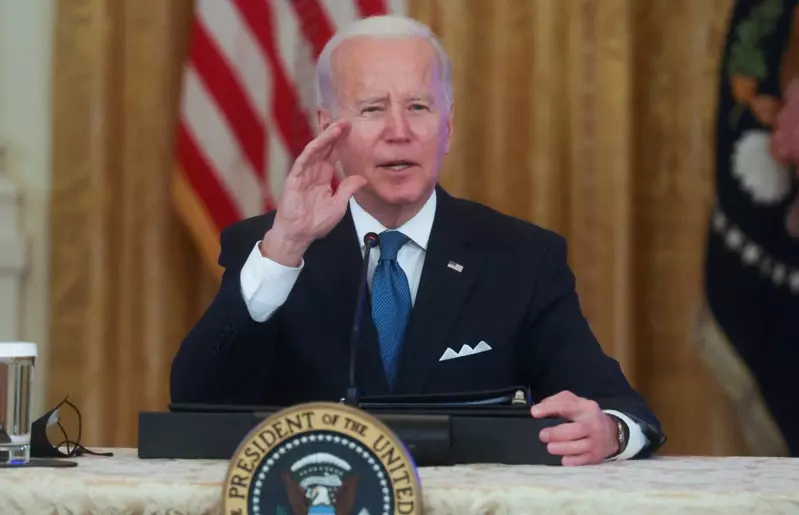
美国总统拜登24日在白宫举行记者会,散场时,福斯新闻记者杜西(Peter Docy)向拜登提出一个通膨的问题,未料拜登竟回应「愚蠢的王八蛋(stupid son of a bitch)」,引发外界热议。
Jan 24, 2022
During an event on lowering prices for American families, President Biden was caught on a hot mic calling Fox News’ Peter Doocy ‘a stupid son of a bitch’ after Doocy asked a question about inflation.
英国独立报报导,杜西在媒体纷纷退场时,突然问拜登「你认为通货膨胀是期中选举的政治负担吗?」拜登则回应,「不,这是一笔巨大的财富。」并又接着说「更多的通货膨胀,真是个愚蠢的王八蛋(What a stupid son of a bitch)。」
目前尚不清楚拜登是否以为麦克风关了才会说脏话,白宫尚未做出回应。对此,杜西显得不是很在意,说他甚至没有听到拜登的回应,因为房间内满是噪音。
美国有线电视新闻网(CNN)白宫记者柯林斯(Kaitlan Collins)表示,拜登说话时完全知道他面前有麦克风,「麦克风就在那面前,这不像是他走进书房时忘记他西装外套衣领上有别麦克风,它就在他面前」。
攀上拜登 游说公司各个都发大财
华盛顿顶尖游说企业揭露2021年的游说收益纪录,结果与拜登总统及其政府关系良好的企业受惠最多。
政治新闻网站Politco报导,拜登担任参院司法委员会主席时期的前助理普塔拉(Chris Putala)经营的游说公司「普塔拉策略」(Putala Strategies),年度游说收益从2020年的130万元增至2021年的400万元,增幅超过200%。
Jan 22, 2022
Lobbying firms have been raking in more cash than they normally do as the assault on President Biden’s agenda took flight in 2021. It turns out that top firms have had record amounts of profits from their efforts to block social spending, environmental spending, and decreased corporate regulation.
普塔拉在2016年到2020年间没有签到任何一位新客户,但他的公司2021年与十多个新客户签约,包括强大的「美国药品研究与制造商协会」(PhRMA),以及KeystoneXL输油管撑腰企业。
游说揭露文档显示,普塔拉去年代表T-Mobile、康卡斯特(Comcast)等通信媒体公司,以及娱乐软件协会(ESA)、美国互联网与电视协会(NCTA)等商业协会,以及荷兰芯片制造商「艾司摩尔」(ASML)等企业,向白宫或总统行政办公室游说。
此外,白宫顾问史蒂夫‧芮契提(Steve Ricchetti)胞弟杰夫‧芮契提(Jeff Ricchetti)的「芮契提公司」(Ricchetti Inc.)游说收益,在拜登2020年成为民主党总统候选人后,跟着水涨船高。
芮契提公司2021年赚进320万元游说费用,比2020年的130万元增加150%,但在史蒂夫是白宫顾问的消息曝光后,杰夫2021年10月到12月就没有再替任何客户游说白宫,而是转而替亚马逊(Amazon)、通用汽车(GM)、生物制药公司Horizon Therapeutics、葛兰素史克(GlaxoSmithKline),以及保险与财务规画贸易集团Finseca等游说参众两院。
Oct 3, 2020
Lobbying is a huge industry in the U.S. In 2019, around 12,000 registered professionals helped clients spend over $3.5 billion, which seems to pay off. According to one study, for every dollar spent on lobbying and campaign contributions, a corporation can receive up to $760 from the government. Still, lobbying is often criticized and public perception of the practice is low. Opponents say that the industry isn’t adequately regulated, and that the ability to influence policy is in the favor of those with unlimited financial resources. Supporters say that without their in-depth expertise, lawmakers wouldn’t be able to do their job effectively and efficiently. Watch the video above to understand how lobbying works, why it exists and how it became a powerful tool for businesses.
另外,拜登担任副总统时的前立法事务主任亨利(Sudafi Henry)是华府「TheGROUP」游说公司的合伙人,该公司的年度游说收益从2020年的360万元,增至2021年的750万元。
TheGROUP也雇用恩斯亚(Kwabena Nsiah),恩斯亚曾为白宫高级顾问李奇蒙(Cedric Richmond)担任联邦众议员时期的幕僚长,恩斯亚也是前现任卫生部长贝西拉(Xavier Becerra)担任联邦众议员时的助理。
Biden-tied lobbying firms raked in the dough during his first year
Shops that employed former aides to the current president saw massive increases in clients and fees in 2021.
By CAITLIN OPRYSKO
01/24/2022

Lobbying disclosures that a phalanx of former Biden Senate aides and lobbyists with ties to the Biden administration have experienced a significant surge of revenues. | J. Scott Applewhite/AP Photo
Washington’s top lobbying firms reported record lobbying revenues in 2021, and perhaps no one benefited more than lobbying shops with ties to President Joe Biden and his administration.
At Putala Strategies, a firm run by Chris Putala, a former aide to Biden from his time on the Senate Judiciary Committee, annual lobbying revenues soared from $1.3 million in 2020 to $4 million in 2021 — an increase of more than 200 percent — according to a review of lobbying disclosures.
Putala signed more than a dozen new clients in 2021, including the powerful drug lobby the Pharmaceutical Research & Manufacturers of America and the company behind the KeystoneXL pipeline, both of which were fighting unfavorable policy proposals from Biden. That’s nearly as many as the one-man firm signed in the entire decade prior. (Putala signed no new clients between 2016 and 2020, when his former boss was no longer in office, according to lobbying disclosures.)
Lobbying disclosures show that throughout the year, Putala lobbied the White House or the Executive Office of the President on behalf of several prominent corporate clients including T-Mobile and Comcast. Putala also lobbied the White House on behalf of several tech trade associations, the Entertainment Software Association and the NCTA — The Internet & Television Association, as well as the U.S. subsidiary of the Dutch chipmaker ASML. Putala did not immediately respond to a request for comment.
Jeff Ricchetti, the brother of top Biden adviser Steve Ricchetti, saw lobbying revenues continue to climb for his firm Ricchetti Inc., a trend that began in 2020 when Biden became the presumptive Democratic presidential nominee.
Ricchetti’s firm brought in $3.2 million in lobbying fees in 2021, up from $1.3 million in 2020 — a 150 percent increase. Ricchetti did not report lobbying the White House for any of his clients last quarter, having formally sworn off lobbying the West Wing amid backlash over a growing contingent of family members joining the Biden administration.
Still, he reported lobbying the House and Senate for a number of blue chip companies including Amazon and General Motors, the pharmaceutical companies Horizon Therapeutics and GlaxoSmithKline and Finseca, a trade group representing life insurers and financial planners, all on key parts of Biden’s legislative agenda. Ricchetti did not immediately respond to a request for comment.
At TheGROUP D.C., where Sudafi Henry, Biden’s former vice presidential director of legislative affairs, is a partner, annual lobbying revenues more than doubled from $3.6 million in 2020 to $7.5 million in 2021. The firm also employs Kwabena Nsiah, who served as chief of staff to Biden’s top Hill liaison Cedric Richmond during Richmond’s time in the House. Nsiah was also a congressional aide to former Rep. Xavier Becerra, now Biden’s Health and Human Services secretary.
Like other firms with ties to Biden or his aides, TheGROUP boasts a growing roster of major corporate clients, from Pfizer to Lyft to Facebook parent company Meta.
According to disclosures, Henry, Nsiah and their firm lobbied the White House on behalf of several of those clients over the past year, including Abbott Labs (one of the major manufacturers of Covid tests), the American Health Care Association, the U.S. Black Chambers Inc., Charter Communications, Dell and Pfizer. It was the first time the firm has ever reported lobbying the White House. TheGROUP did not immediately respond to a request for comment.
Putala, Richetti and TheGROUP weren’t the only firms reaping the benefits of the handover from Republican to Democratic control of Washington last year. K Street shattered lobbying fee records they set only a year prior, as a new administration and an all-Democratic Washington worked to enact trillions of dollars in new spending while cracking down on an array of sectors from the tech industry to fossil fuels and pharmaceuticals.
The passage of yet another coronavirus relief package in the spring and the bipartisan infrastructure bill in the fall, along with the on-again-off-again negotiations on another $1 trillion-plus social spending and climate package, drove new clients from new industries into lobbyists’ arms.
The new White House even lured one of K Street’s biggest names back into the influence game. Tony Podesta, the Democratic super lobbyist whose eponymous firm The Podesta Group collapsed after it came under scrutiny from special counsel Robert Mueller, reemerged on the lobbying scene this year, bringing in $1 million from the blacklisted Chinese telecom giant Huawei in just six months of work, lobbying disclosures show.
全球最大对冲基金创始人:美国需要一剂中国的“共同富裕药”
观察者网
01/11/2022
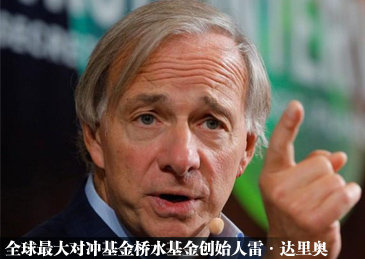
据彭博社1月11日报道,全球最大对冲基金桥水基金的创始人雷·达里奥(Ray Dalio)说,美国需要一剂中国的“共同富裕药”。他在敦促美国等国缩小贫富差距的同时,赞扬了中国推动共同富裕的努力。
彭博社称,为处理贫富差距问题,中国监管机构在科技行业采取一系列行动,引发一些投资者担忧。
10日,达里奥在瑞银集团的一场投资会议上说,中国的共同富裕政策经常受到国际投资者误解,但这样做有助于促进更公平的财富和机会再分配,使中国经济能够拥有更广泛的人才资源。
他在视频中表示,“你先富起来,再强调以更平等的方式分配这些机会。美国需要通过自己的制度,推动共同富裕,许多其他国家也是如此。”

“你不知道顶尖人才的出身。他可能来自贫困、弱势群体,也可能来自最光鲜亮丽的家庭。(通过共同富裕政策)你可以吸引这些人才,让经济变得更好、更繁荣,创建一个更公平的体系。”
近期,达里奥有关中国的积极言论招来了美国政客的非议。去年11月30日,他在接受CNBC采访时谈到中国,反问“我是否该因为我们自己的人权问题和其他事情,而不投资美国?”
美媒介绍,达里奥是中国的长期热烈支持者。近40年过去,他直言不讳地肯定中国,并偶尔引发争议。1995年,达里奥曾把11岁的儿子马特送到北京生活和学习一年。
Jan 11, 2022
Ray Dalio, founder of Bridgewater Associates, is praising China’s push for common prosperity while urging the U.S. and other nations to narrow their wealth gaps. Bloomberg’s Tom Mackenzie reports.
与金融大鳄索罗斯去年叫嚣“投资中国是悲剧”不同,达里奥认为,从一个经济体的收入与支出,资产与债务,以及一个国家的内部秩序和发生外部冲突的可能性等标准来看,在美国投资的风险更大。
“在其中大多数方面,我们看到美国正面临更多风险因素,教育水平、竞争优势等其他方面也在下降。”他还说,虽然科技仍是美国的一个亮点,但更新速度要慢于中国。
桑德斯: 民主党背弃了工人阶级 劳动者支持共和党
来源:卫报
01/11/2022
桑德斯的上述言论在外界看来,似乎反映出其正在对拜登政府产生的不满,而在白宫看来,或许将是一记警钟。因为在去年,正是由于获得了来自桑德斯为代表的民主党内进步派力量支持,拜登才得以明显优势击败前总统特朗普,避免成为了另一个希拉里。
访谈中,桑德斯还提到当下正是民主党人挑战超级富豪、权势公司的好时机,因为这将得到广大美国人民的支持。“人们希望富人也能公平纳税”、“他们已经发现,杰夫·贝索斯、埃隆·马斯克这些富人却不用缴一毛钱联邦税是件极其荒唐的事情”。他也就日前拜登推动延长儿童税收抵免的临时政策表示欢迎,“这向劳动人民证明了,愿意站出来直面美国统治阶级的贪婪,也是一件好事”。
另外,桑德斯还反复将美国天价处方药的事实摆出来,称制药业在华盛顿的1500名说客正竭尽全力确保药品成本不会被降低,并强调这就是“企业的贪婪”。
桑德斯认为,民主党有必要“澄清事实”,向制药公司大声说“我们谈论的是工人阶级的需求”。他特别强调,在谈话中一定要使用“工人阶级”这一表述,“民主党人必须表明他们站在工人阶级一边,准备与富人和权势较量,这在事实上和政治上都是正确的做法。”
Sen. Bernie Sanders talks about the Democratic Party’s relationship with the American working class and connecting with striking workers in red states.
桑德斯是2016、2020两届美国总统候选人,在美国被视为“社会主义者”,但其政治主张局限于局部改良,属于“民主社会主义者”。80岁仍充满激情的他坚持优先考虑工人阶级等这一“多数美国人民”的需求,对超级富豪征税就一直是其政纲的一个重要组成部分,因此更容易打动那些时刻被低工资、没有前途的工作、债务、无家可归、缺乏医疗保健所困扰的美国年轻选民们。
值得一提的是,桑德斯最近几次火出圈多因炮轰各大超级富豪。去年3月份,桑德斯就在推特上发文称:“我们正处于美国历史上的一个时刻,马斯克和贝索斯拥有的财富超过了这个国家最底层40%的人,与此同时,我们看到美国的饥饿程度比几十年来任何时候都要严重。这种程度的贪婪和不平等不仅是不道德的。这是不可持续的。”
到了11月,桑德斯再次开炮,“我们必须要求极度富有的人缴纳公平的税负,没有讨论的余地。”只是这次很快引来了马斯克的对喷,他直接嘲讽桑德斯,“我一直忘记你还活着”。
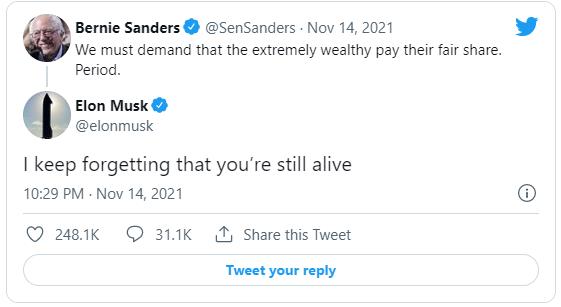
Bernie Sanders says Democrats are failing: ‘The party has turned its back on the working class’
By Steven Greenhouse
01/11/2022
In an exclusive interview, the senator says it’s time to ‘step up and take on the greed of the ruling class in America’
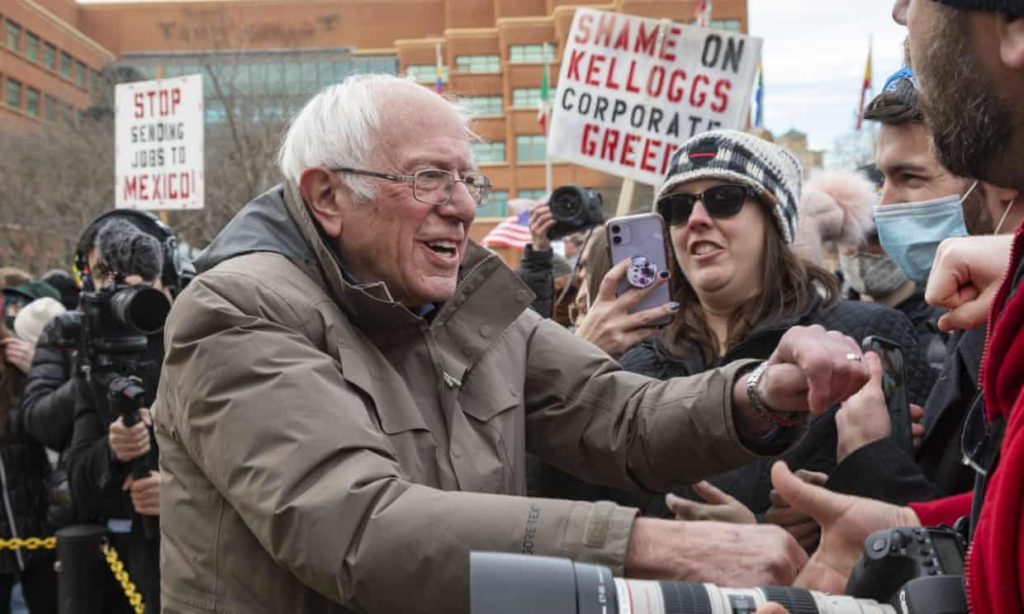
Senator Bernie Sanders has called on Democrats to make “a major course correction” that focuses on fighting for America’s working class and standing up to “powerful corporate interests” because the Democrats’ legislative agenda is stalled and their party faces tough prospects in this November’s elections.
The White House is likely to see his comments as a shot across the bow by the left wing of a party increasingly frustrated at how centrist Democrats have managed to scupper or delay huge chunks of Biden’s domestic policy plans.
In an interview with the Guardian, Sanders called on Joe Biden and the Senate majority leader, Chuck Schumer, to push to hold votes on individual bills that would be a boon to working families, citing extending the child tax credit, cutting prescription drug prices and raising the federal hourly minimum wage to $15.
Such votes would be good policy and good politics, the Vermont senator insisted, saying they would show the Democrats battling for the working class while highlighting Republican opposition to hugely popular policies.
Jan 11, 2022
Sen. Bernie Sanders talks about the enormously popular issues in Build Back Better and what the residents of West Virginia want from the federal government.
“It is no great secret that the Republican party is winning more and more support from working people,” Sanders said. “It’s not because the Republican party has anything to say to them. It’s because in too many ways the Democratic party has turned its back on the working class.”
Sanders, who ran for the party’s nomination in both 2016 and 2020, losing out in fierce contests to Hillary Clinton and then Biden, is a popular figure on the left of the party. The democratic socialist from Vermont remains influential and has been supportive of Biden during his first year as the party tries to cope with the twin threats of the pandemic and a resurgent and increasingly extremist Republican party.
But his comments appear to reflect a growing discontent and concern with the Biden administration’s direction. “I think it’s absolutely important that we do a major course correction,” Sanders continued. “It’s important that we have the guts to take on the very powerful corporate interests that have an unbelievably powerful hold on the economy of this country.”
The individual bills that Sanders favors might not attract the 60 votes needed to overcome a Republican filibuster, and a defeat on them could embarrass the Democrats. But Sanders, chairman of the Senate budget committee and one of the nation’s most prominent progressive voices, said, “People can understand that you sometimes don’t have the votes. But they can’t understand why we haven’t brought up important legislation that 70 or 80% of the American people support.”
Sanders spoke to the Guardian on 6 January, the same day he issued a statement that the best way to safeguard our democracy is not just to enact legislation that protects voting rights, but to address the concerns of “the vast majority of Americans” for whom “there is a disconnect between the realities of their lives and what goes on in Washington”.
He said millions of Americans were concerned with such “painful realities” as “low wages, dead-end jobs, debt, homelessness, lack of healthcare”. In that statement, he said, many working-class Americans have grown disaffected with the political system because “nothing changes” for them “or, if it does, it’s usually for the worse”.
In the interview, Sanders repeatedly said that Democrats need to demonstrate vigorously and visibly that they’re fighting to improve the lives of working-class Americans. “The truth of the matter is people are going to work, and half of them are living paycheck to paycheck,” Sanders said. “People are struggling with healthcare, with prescription drugs. Young families can’t afford childcare. Older workers are worried to death about retirement.”
Sanders has long been troubled by America’s increasing wealth and income inequality, but he made clear that he thinks it is time for Democrats to take on the ultra-wealthy and powerful corporations – a move he said vast numbers of Americans would support. “They want the wealthy to start paying their fair share of taxes,” he said. “They think it’s absurd that Jeff Bezos and Elon Musk don’t pay a nickel in federal taxes.”
He praised Biden for pushing for improved childcare and extending the child tax credit. But he said it would also be good to “show working people that you are willing to step up and take on the greed of the ruling class in America right now.” He pointed repeatedly to the high prices for prescription drugs as an example of “corporate greed”.
“There is no issue that people care more about than that we pay the highest prices for prescription drugs in the world,’’ he said, adding that the pharmaceutical industry has 1,500 lobbyists in Washington who “tried everything to make sure we don’t lower the cost of pharmaceuticals”.
The senator said: “I think the Democrats are going to have to clear the air and say to the drug companies – and say it loudly – we’re talking about the needs of the working class – and use the expression ‘working class’. The Democrats have to make clear that they’re on the side of the working class and ready to take on the wealthy and powerful. That is not only the right thing to do, but I think it will be the politically right thing to do.”
Last Wednesday evening, Sanders did a nationwide live stream in which he talked with the leaders of three long strikes: Warrior Met Coal in Alabama, Special Metals in West Virginia and the Rich Product Corporation’s Jon Donaire Desserts subsidiary in southern California. Noting that hedge funds or billionaires own large stakes in all three companies, he railed against those companies for offering modest raises or demanding that workers pay far more for health coverage even though the owners’ wealth has soared during the pandemic thanks to the booming stock market.
“These entities, where the people on top have done phenomenally well, are squeezing their workers and lowering the standard of living for workers who are striking,” Sanders said. “It’s unacceptable.”
In December, Sanders went to Battle Creek, Michigan, to support 1,400 Kellogg’s workers who were on strike at cereal factories in that city as well as in Memphis, Tennessee; Omaha, Nebraska; and Lancaster, Pennsylvania. In the interview, Sanders said, “I think the Democratic party has to address the long-simmering debate, which is, Which side are you on? Are we prepared to stand with working families and take on powerful corporate interests?”
Sanders voiced frustration with the lack of progress on Biden’s Build Back Better legislation, which the Democrats sought to enact through budget reconciliation, a process that requires only a simple majority to pass. That effort was slowed by lengthy negotiations with the centrist senators Joe Manchin of West Virginia and Kyrsten Sinema of Arizona – and then blocked when Manchin said he opposed the $2tn package, sparking leftwing fury and deep frustration in the White House.
“We have tried a strategy over the last several months, which has been mostly backdoor negotiations with a handful of senators,” Sanders said. “It hasn’t succeeded on Build Back Better or on voting rights. It has demoralized millions of Americans.”
He called for reviving a robust version of Build Back Better and also called for holding votes on individual parts of that legislation that would help working-class Americans. “We have to bring these things to the floor,” Sanders said. “The vast majority of people in the [Democratic] caucus are willing to fight for good policy.”
Sanders added: “If I were Senator Sinema and a vote came up to lower the outrageously high cost of prescription drugs, I’d think twice if I want to get re-elected in Arizona to vote against that. If I were Mr Manchin and I know that tens of thousands of struggling families in West Virginia benefited from the expansion of the child tax credit, I’d think long and hard before I voted against it.”
Sanders also called for legislation on another issue he has championed: having Medicare provide dental, vision and hearing benefits. “All these issues, they are just not Bernie Sanders standing up and saying this would be a great thing,” he said. “They are issues that are enormously popular, and on every one of them, the Republicans are in opposition. But a lot of people don’t know that because the Republicans haven’t been forced to vote on them.”
民主不灵了? 民主国家面临的最大困境是什么?
文章来源: 纽约时报中文网
12/30/2021
我们很少注意到,产生有力的政府是民主的一个关键价值。对于民主倒退所构成的威胁,以及包括美国在内的几个民主国家中崛起的狭隘势力,我们都耳熟能详。但几乎所有西方民主国家如今所面临的最普遍、或许也是最深刻的挑战,还是民主政治中的政治碎片化。
政治碎片化指的是政治权力分散到许多不同派别和势力中心,使得民主政府难以有效运作。
拜登总统认识到了这一历史性挑战,称自己总统任期的决定性使命就是赢得“21世纪的民主效用与专制之间的斗争”。
然而,即便有政府统一管控,他的两党基础设施法案的通过仍然因为民主党内的分歧被推迟了好几个月,让人无法确定“重建更美好未来”的提案能否成为现实——哪怕只是一部分。
当民主政府似乎无力兑现承诺,这样的失败可能会导致许多公民的疏离、气馁、不信任和沉默。这也可能激发民众对保证能结束混乱政治局面的威权领导人的支持。在更极端的情况下,这会导致民众对民主本身产生质疑,并对反民主的政府体制持开放态度。
拜登政府在实现其政策议程上所面临的困境为所有正在经历政治碎片化的西方民主国家提供了一个很好的案例。这种碎片化在欧洲的多党制和美国的两党制中有不同的表现形式。欧洲民主国家正面临传统上占主导地位的中左和中右派主流政党及联盟的瓦解,这些势力自“二战”以来执政至今。对这些党派的支持已经碎裂成新的右翼和左翼政党,还有其他一些不太容易界定意识形态成分的派别。2015年至2017年,有30多个新政党进入了欧洲议会。在欧洲民主国家中,对某一政党有强烈认同感,或是属于某一党派的人口比例急剧下降。
这对政府执政能力的影响是巨大的。在自上世纪50年代以来就是欧洲中流砥柱的德国,两大主流政党通常能得到超过90%的选票;在今秋大选中,两大主流政党的得票率跌至不到50%。失去的选票都转而支持环保、反移民、自由市场和其他政党。在2017年大选后,由于选票分散到了许多政党之中,德国用了六个月时间才组建出一个执政联盟,耗时创造了该国的历史记录。荷兰在2017年大选后也用了创纪录的225天才组建出一个政府。
在如此嘈杂的党派杂音中组建的联合政府也更加脆弱。例如,西班牙在2015年至2019年期间被迫举行了四次全国选举,只为选出一个稳定的执政联盟。直到2015年之前,西班牙基本都是两党民主制,但大规模抗议运动催生出大量新党派,使得建立稳定政府变得困难。今年夏天,瑞典首相在不信任投票中落败——这在该国现代历史中尚属首次。就像英国脱欧党在英国,以及五星运动在意大利所产生的影响那样,昙花一现的数字化政党——包括反政党政党——不知道从哪里冒了出来,从根本上扰乱了政治。
在其他民主国家制造碎片化的同一种力量也在搅乱美国,尽管我们的选举结构基本杜绝了第三党派上台的可能。在这里,碎片化的力量被引入了两大主流政党内部。共和党方面,最引人瞩目的例子就是在2011年至2019年该党控制众议院之时,吞噬了约翰·博纳和保罗·瑞安这两位议长。博纳的回忆录描绘了一个四分五裂的党团核心,根本无法实施治理。
无独有偶,民主党是否能克服内部矛盾,制定出有效政策,也是拜登政府面临的核心问题。明显的例子就是,佩洛西议长原本计划就基础设施法案进行表决,结果却取消了投票,因为她无法获得足够的民主党赞成票——这一非同寻常的事实表明,在分裂的力量面前,一位议长要让她的党团团结起来是多么困难。在一个灾难性的选举夜,进步派才终于放下了担忧支持该法案——其中一些人现在还后悔这么做了。
至少就目前而言,《重建更美好未来》提案最近遭受的失败,导致了党内不同派系之间的恶斗被公布于众。
巨大的结构性力量推动了整个西方政治的碎片化。在经济层面,全球化导致中产阶级和工薪阶层收入停滞不前,不平等的现象加剧,还有2008年金融危机引发的愤怒。在文化层面则是移民问题上的冲突、民族主义以及其他问题。
自美国实施罗斯福新政和欧洲打响“二战”以来,左翼政党一直代表着不太富裕、受教育程度低的选民利益。而今,这些选民正在成为右翼政党的根基,更富裕、受教育程度更高的选民转而支持左派。对于如何在这种颠覆性的转变中拼凑出能赢得选举的联盟,主流政党一直头痛不已。
通讯革命也是造成政治分裂僵化的主要因素。它在整个欧洲推动了组织松散的无领袖抗议运动的兴起,扰乱了政治,并催生了其他政党——但也使有效政府更加难以实现。
在美国,新通讯时代让自由政客的崛起成为可能。一个自由政客越来越多的国会将更难实施治理。即使是在上任之初,个别国会议员(如亚历山大·奥卡西奥-科尔特斯和特德·克鲁兹)也不再需要通过党内政绩或是在主要委员会任职来获得全国知名度和影响力。
通过有线电视和社交媒体,他们可以寻找并打造自己的全国性选区。通过互联网筹款(特别是小额捐款),政客(尤其是立场极端的)得以化身强大的筹款机器。在这个时代,政党领袖失去了他们曾经用来迫使党内成员接受党派路线的影响力。这就是为什么众议院议长会辞职,或者需要在无法拿出理想结果时重新安排投票日程。
如今几乎所有西方民主国家都面临的政治碎片化,反映了民众对传统政党和政府实施有效政策的能力的强烈不满。而另一方面,这种碎片化也使得政府更难做到这一点。拜登说的没错:民主国家必须找到克服分裂力量的办法,以再次证明有效政府是可以实现的。
A reality check – Exporting war under veil of democracy
12/10/2021
Democracy should reflect the will of the people. But what happens when that will is ignored? The U.S. describes itself as a democratic country. Yet, it has rampant gun violence and racial discrimination, widening social inequality, needless overseas wars, and the worst record of COVID-19 deaths globally. In an original two-part series, CGTN takes a hard look at how democracy is slowly eroding in the U.S. and how it may spread throughout the world if not stopped. Join us for “U.S. Democracy: A reality check,” only on CGTN.
A reality check: The lighthouse of democracy dies down
12/10/2021
Dec 10, 2021
Democracy should reflect the will of the people. But what happens when that will is ignored? The U.S. describes itself as a democratic country. Yet, it has rampant gun violence and racial discrimination, widening social inequality, needless overseas wars, and the worst record of COVID-19 deaths globally. In this special program, CGTN takes a look at how democracy is slowly eroding in the U.S. and how it may spread throughout the world if not stopped.
民主峰会沦圈地运动 恐不利拜登外交布局
世界新闻网
12/10/2021
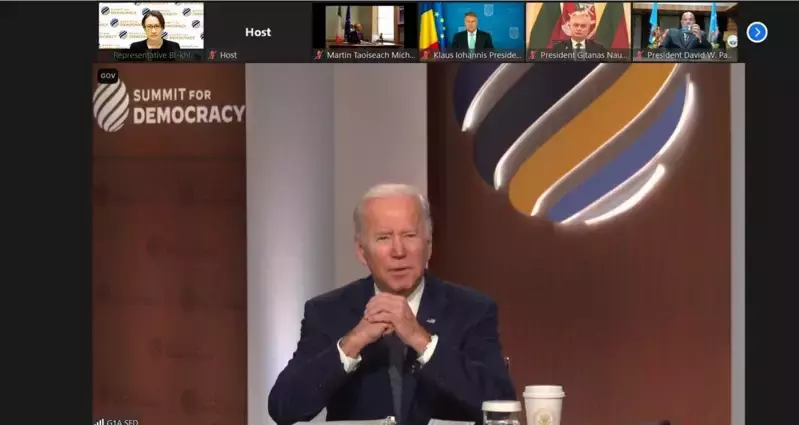
由美国发起的民主峰会,从一开始就被外界视为「围堵中国」的战术之一,中国也打着民主的旗号另辟战场;这也让主办方设置的「盛会」,沦为敲锣打鼓的「美中互相圈地运动」,反而让受邀者怕被粘贴标签而望之却步;已预料雷声大雨点小的结果,很可能斲伤美国的领导威信,不利拜登整体外交布局。
Dec 9, 2021
拜登今年1月重返欧洲起,就再三向盟友保证「不要求大家在美中之间选边站」,但民主峰会遭华盛顿邮报质疑,与会成员的民主品质良莠不齐,且不脱地缘政治考量,在在让外界看到美国为团结盟友伙伴,对抗中国的图穷匕见。
民主党政府上台后,外交动作频仍,无论是双边或多边的联合声明,应对新冠或强化供应链等针对特定议题的会议,基本上各国和民间企业都很给面子出席,也许下若干承诺,唯独这次的民主峰会,拜登竭力吹拉弹唱,具体共识结论犹未可知。
美中「密集竞争」,从联合国组织、疫苗援助到台湾议题,经常亦步亦趋,双方大动作或少,小动作却不断;这次美国的民主峰会登场前,中国抢先一步开了「民主论坛」,形同正面接战。但如此拉帮结派画分阵营,与圈地何异?对于被迫入伙的国家来说,实质利益和副作用又该如何计算?
包含美国在内,世界各国的期待与其说是「有效和陆方竞争」,更该说是「避免美中陷入冷战式的集团对抗」。
但台湾的执政党不这样看,民进党政府从一开始便积极高调宣传此事,强化自己亚洲民主灯塔的形象,在军事和外交压力环伺的状况下与美国交心,却无力打开两岸沟通管道。
驻美代表萧美琴和拜登等民主盟友「同框」的这一天,尼加拉瓜选择和中华民国断交,与中华人民共和国建交,映照的正是国际政治现实下的「民主价值」与「国家利益」;台湾不是唯一面临这道难题的国家,世界各国亦如是。
「民主」为美国为重返世界所高举的旗帜,却在激烈大国竞争的状态下被稀释和转化,可能并非拜登这个政坛老将所愿,他更该忧心的是,这场峰会落幕后,美国的领导威信如何维持,是否还能联合世界各国与中国竞争或对抗。
尼加拉瓜加速倒向中国与台断交 美国「推了一把」?
世界新闻网
12/09/2021

中美洲国家尼加拉瓜宣布与中华民国断交,改与中华人民共和国建交,这除了与中共极力拉拢尼加拉瓜外,也与近来美国制裁尼加拉瓜,加速尼国倒向中国有关。
中美洲临近美国,多数国家的外交政策深受美国影响,但尼加拉瓜左派阵营的奥蒂嘉当选总统以来一直与美国龃龉,多番批评美国,是少数与美国唱反调的中美洲国家。
Dec 9, 2021
当地时间12月9日下午,尼加拉瓜外交部发表声明,宣布与台湾断绝“外交关系”。声明说,世界上只有一个中国,中华人民共和国是代表中国的唯一合法政府,台湾是中国领土不可分割的一部分。尼加拉瓜自即日起断绝与台湾的“外交关系”并停止与台湾的一切接触和官方联系。
美国众议院先前通过对尼加拉瓜制裁,指控奥蒂嘉妨碍总统大选公平举行,并把尼国推向一党专政独裁国家。今年11月8日美国拜登政府在尼加拉瓜进行新一轮大选的时候,拜登再指控奥蒂嘉及其妻子,多年来利用武力和囚禁的方式来压制国内反对派,从而确保他们稳坐政府总统之位。拜登还强调,美国将采用「一切外交和经济手段」帮助尼加拉瓜民众,制裁和追究奥蒂嘉政府的责任。
美国的举动让台湾与尼国的外交关系更加尴尬,台湾在中美洲的影响力,无疑受益于美国为其背书;但尼加拉瓜与美国关系弄僵,台湾的外交处境自更艰困。不少西方媒体就报导,美国一直想推翻奥蒂嘉政府,加大对尼加拉瓜政府的制裁力度,此举只会进一步刺激尼加拉瓜向中国和俄罗斯靠近。
尼加拉瓜现任总统奥蒂嘉担任尼国多年总统(一任五年)。1985年,奥蒂嘉的左翼政党桑定民族解放阵线当选后,尼加拉瓜宣布与中国建交,与台方断交。到了1990年右翼「全国联盟」领导人查莫洛夫人上台,尼加拉瓜宣布与台湾复交,中共随即与尼国断交。
Dec 9, 2021
2006年奥蒂嘉复出重新当选总统,2011年连任,2014年修宪取消连任限制,2016年连任,2021年11月又再度当选,进入第四任总统。他也是当前中美洲国家在位最久的元首。
新华社曾报导,奥蒂嘉在2006年竞选期间曾说过,如获选的话,尼加拉瓜新政府将优先考虑与中华人民共和国恢复创建外交和经济关系,届时只待中国驻尼加拉瓜大使递交国书,尼中即可复交。2014年他接受中国大陆媒体访问时也明确表达:「愿与中国再次相遇」。
尼国的「桑定」阵营长年与中国共产党保持党际交流,近年在新疆、香港人权议题上也立场鲜明地支持中国。
尽管奥蒂嘉多次表达和中国大陆复交的愿望,但2008至2016年台湾马政府执政时,两岸「外交休兵」,北京并未同意复交,以免影响改善中的两岸关系。如今台湾不承认九二共识,「外交休兵」默契已去,尼国与台湾断交改与中共建交已成迟早会发生的事。近来美国的加大制裁,只是个导火线,让尼加拉瓜无所顾忌转与中共复交,与我断交。
Dec 9, 2021
同样最近刚结束大选的我友邦洪都拉斯,已获胜选的卡斯楚早前表示当选后会与中共建交,但受到美国压力后已改口「尚未决定」,如今受到隔邻尼加拉瓜最新的外交举动影响,是否会有变量,也让各界关注。
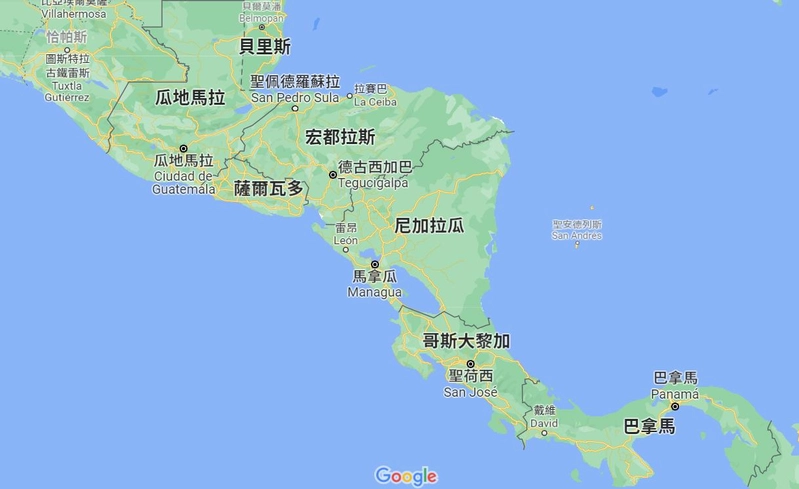
快讯: 尼加拉瓜政府宣布与中华民国断交 与中国建交
中央社
12/09/2021
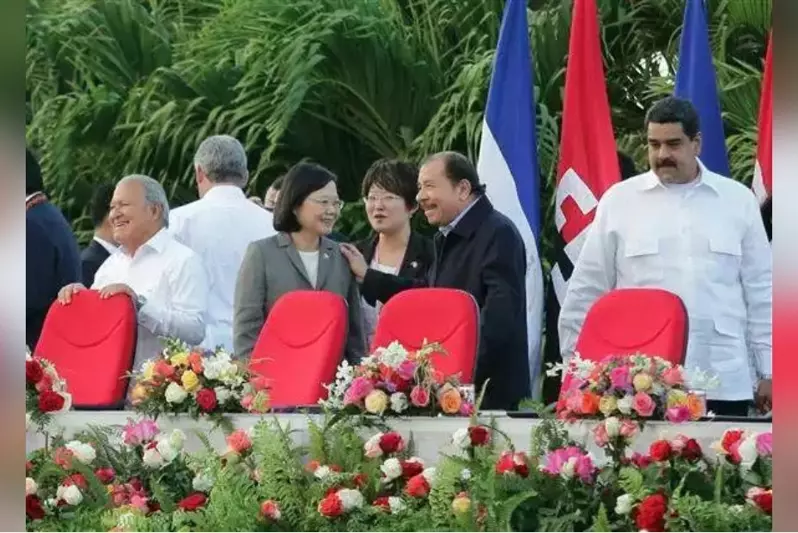
尼加拉瓜政府今天宣布,与中华民国断绝外交关系。
尼加拉瓜政府今宣布与中华民国断交。这是中美洲国家尼加拉瓜史上第二次与中华民国断交,两次相隔36年,而且决定都是由奥蒂嘉(José Daniel Ortega Saavedra)主政期间做成。
奥蒂嘉现年76岁,原本是左派反阵政府阵线的领导者,1979年取得政权后,于1985年12月首次中断与中华民国55年的外交关系,并承认北京,直到1990年查莫洛夫人(Violeta Barrios Torres de Chamorro)领导的政府上台,再度承认中华民国。
2006年奥蒂嘉再次当选总统,此后对台湾的态度暧昧,尼加拉瓜被视为可能倒向中国的中美洲国家之一。
尼加拉瓜转向后,中华民国台湾的邦交国减为14个,包括8个拉丁美洲和加勒比海国家。
记者陈言乔/即时报导
中国央视报导,当地时间12月9日下午,中美洲国家尼加拉瓜政府发表声明:承认世界上只有一个中国。中华人民共和国是代表全中国的唯一合法政府,台湾是中国领土不可分割的一部分。尼加拉瓜政府即日起与台湾断交。
Taiwan ends diplomatic links with Nicaragua
Focus Taiwan
12/09/2021
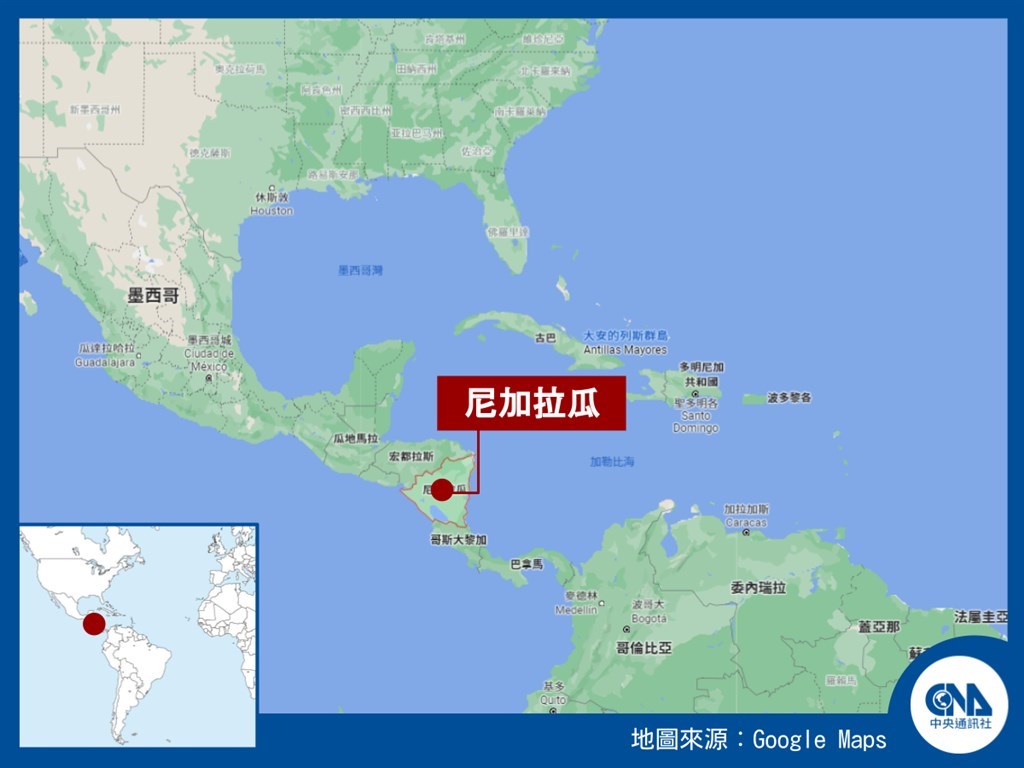
Taipei, Dec. 10 (CNA) Taiwan on Friday terminated its diplomatic relations with Nicaragua after the Central American country announced its severance of official links with Taipei.
The Ministry of Foreign Affairs said in a statement that the Republic of China (Taiwan) government regrets the Nicaraguan government’s decision and thereby declares that it is terminating diplomatic relations with the country effective immediately, to uphold national dignity.
(By Elizabeth Hsu)
Nicaragua breaks ties with Taiwan, switches allegiance to Beijing
REUTERS
12/09/2021
KEY POINTS
- Nicaragua on Thursday broke its longstanding diplomatic ties with Taiwan, switching allegiance to Beijing in a recognition of the Chinese Communist party’s One China policy and reducing Taipei’s dwindling pool of international allies.
- “The government of the Republic of Nicaragua today breaks diplomatic relations with Taiwan and ceases to have any contact or official relationship,” the foreign ministry said in a statement.
- “As a member of the international community, Taiwan has the right to exchange and develop diplomatic relations with other countries,” Taiwan’s foreign ministry said.
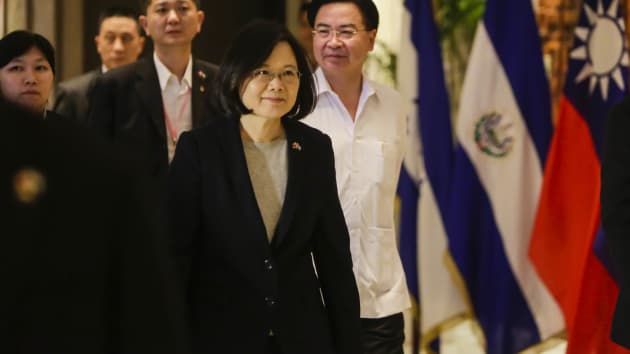
Inti Ocon | AFP | Getty Images
Nicaragua on Thursday broke its longstanding diplomatic ties with Taiwan, switching allegiance to Beijing in a recognition of the Chinese Communist party’s “one China” policy and reducing Taipei’s dwindling pool of international allies.
“The government of the Republic of Nicaragua today breaks diplomatic relations with Taiwan and ceases to have any contact or official relationship,” the foreign ministry said in a statement issued in Spanish and English.
“The People’s Republic of China is the only legitimate government that represents all of China and Taiwan is an inalienable part of the Chinese territory,” it added.
Taiwan responded quickly, expressing “pain and regret” at the decision, and saying that the Central American country’s president, Daniel Ortega, had disregarded the friendship between the peoples of Taiwan and Nicaragua.
But Taiwan’s government also expressed defiance.
“As a member of the international community, Taiwan has the right to exchange and develop diplomatic relations with other countries,” its foreign ministry said.
Taiwan will continue to promote “pragmatic diplomacy” to expand its international space, and strive to achieve Taiwan’s “due international status.”
China says Taiwan is one of its provinces with no right to the trappings of a state, and has stepped up pressure to win away Taiwan’s remaining allies.
China’s ambassador at the United Nations, Zhang Jun, congratulated Nicaragua.
“We highly commend the right decision made by the Government of Nicaragua, which is in line with the prevailing trend of the time and people’s aspiration,” he said in a tweet. “The One-China principle is a consensus widely accepted by the international community and allows no challenge.”
The break with Taiwan is a blow to the United States. It follows months of worsening ties between Ortega and Washington, and came on the day the U.S. State Department said it had slapped sanctions on Nestor Moncada Lau, a national security adviser to Ortega, alleging he operates an import and customs fraud scheme to enrich members of Ortega’s government.
The White House and State Department did not immediately respond to a request for comment.
Last month U.S. President Joe Biden ripped into Ortega, calling Nicaragua’s presidential election a “pantomime” as the former Marxist guerrilla and Cold War adversary of the United States won election for a fourth consecutive term.
One Taiwan-based diplomatic source, familiar with the region, said the move was not a surprise given Washington’s lack of leverage with Ortega due to the sanctions, and that looking to China for aid and support was a natural course of action.
“It appears that Ortega had had enough,” the source told Reuters, speaking on condition of anonymity.
Nicaragua’s move leaves Taiwan with just 14 formal diplomatic allies, most of them in Latin America and the Caribbean, plus a handful of small states.
It also follows threats by the incoming leaders of Honduras to break with Taipei. However, since the Honduran election last month, the team around incoming President Xiomara Castro has rowed back from that position somewhat.
Before Nicaragua, Taiwan lost two allies in quick succession in September of 2019, when the Solomon Islands and Kiribati went over to Beijing.
锁定跨国公司 中国再出招施压立陶宛
世界新闻网
12/09/2021
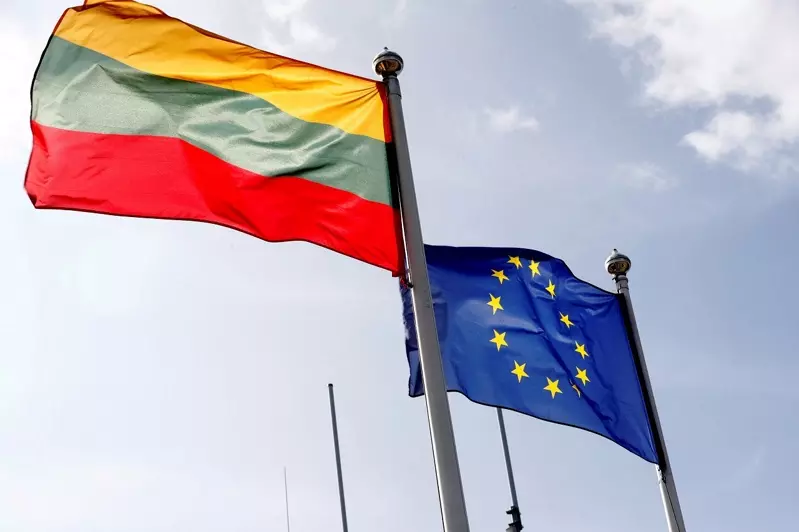
路透9日独家报导,波罗的海国家立陶宛的资深政府官员与产业团体透露,中国已经告知跨国公司,跟立陶宛断绝关系,否则就要面临被中方市场拒之门外。
Nov 22, 2021
立陶宛与中国的直接贸易量不算大,但该国采出口基础经济,境内数百家企业为商品销往中方的跨国公司制造家具、雷射、食物与服装等产品。
立陶宛外交部副部长艾德梅纳斯(Mantas Adomėnas)告诉路透,「他们(中国)一直发送消息给跨国公司,如果他们采用来自立陶宛的零件与供应商,将不再获许销往中国市场或找到当地供应商」。
艾德梅纳斯表示,「我们已看到部分公司取消跟立陶宛供应商的合约」,但他没有说出任何受影响公司或供应商的名称。
代表数千家立陶宛企业的立陶宛工业家联合会(LPK)证实,部分自立陶宛供应商购买货物的跨国公司正被中国锁定。LPK主席努维丘斯(Vidmantas Janulevicius)说,「本周是我们第一次看到中方直接施压一位供应商放弃立陶宛制货物,我们之前只遇过威胁说这可能会发生,现在变成了现实」。
Dec 3, 2021
China closed its door to Lithuania, and here is why.
努维丘斯表示,「对我们来说,最痛苦的部分在于该供应商是一家欧洲公司,许多立陶宛企业是这些公司的供应商」。
据悉,立陶宛正考虑设立一个基金以保护当地企业免受中国的报复,政府则找上处于外交纠纷余波危险之中的企业,就提供贷款等可能财务支持进行磋商。
立陶宛外长求助欧盟:我们没办法单独”制裁”中国
来源:观察者网
12/04/2021
“我们无法实施报复性制裁,因为我们没有办法把中国的这家或那家企业从海关系统中删除。”
在媒体炒作“中国海关‘删除’立陶宛”后,立陶宛外交部长兰茨贝尔吉斯(Gabrielius Landsbergis)12月3日再度就此事发声,并且希望欧盟为其出头。

据立陶宛新闻门户网站“DELFI”当地时间12月3日报道,立陶宛外交部长兰茨贝尔吉斯当天接受媒体采访时,回应了此前立陶宛媒体炒作的“中国海关系统移除立陶宛”事件。
他表示,立陶宛没有能力单独对中国实施制裁,“这是一个欧盟成员国受到部分制裁的史无前例的案例。我们无法实施报复性制裁,因为我们没有办法把中国的这家或那家企业从海关系统中删除。海关系统由欧盟管理,因此我认为相关机构应该代表立陶宛介入此事。”
兰茨贝尔吉斯还说道:“下周,我们将正式向欧盟委员会发表声明,说明目前部分适用于立陶宛的贸易政策,是属于欧盟政策的一部分。我们将要求欧盟保护立陶宛。”
而欧盟委员会发言人则在当天表示,正在了解情况,拒绝置评。
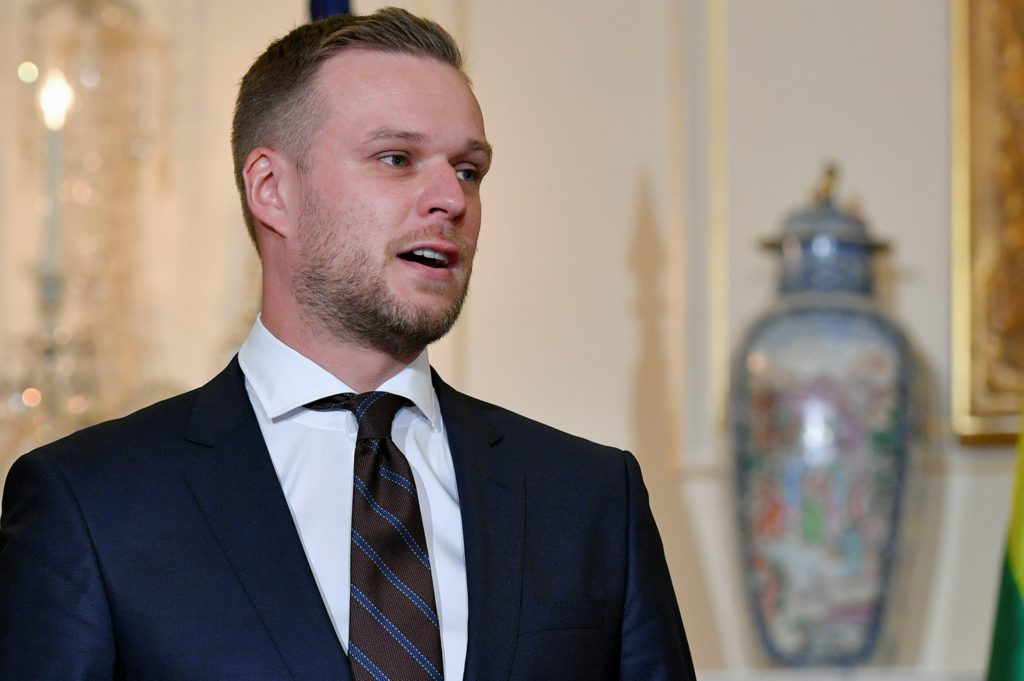
据观察者网此前报道,立陶宛“15分钟”新闻网12月2日援引一家立陶宛木材出口商的话报道称,中国海关似乎已经把立陶宛从系统中移除,这导致他们的货品无法在华清关。立陶宛外交部当天证实了这一消息,并且称“已经联系了欧盟委员会,寻求在欧盟层面协调反应。”

今年11月18日,立陶宛不顾中方严正抗议和反复交涉,允许台湾当局设立“驻立陶宛台湾代表处”。此事导致中方在11月22日宣布将中立两国外交关系降为代办级。
值得一提的是,在立陶宛允许台当局设立“驻立陶宛台湾代表处”仅仅一天后,立陶宛经济部长奥林·阿莫奈特(Ausrine Armonaite)就对外透露称,立陶宛将与美国进出口银行签署一项6亿美元的出口信贷协议。外媒称,立陶宛是在“惹怒中方”的情况下,有望获得美国的贸易支持。除了美国,立陶宛很快又找上欧盟,索要“更多的实在支持”。
官方统计数字显示,立陶宛的主要贸易对象是欧盟国家,2020 年,该国向中国出口了价值 3 亿欧元的商品,中国是其第 22 大出口目的地。
俄媒文章:立陶宛对美国表忠心很夸张很白痴
参考消息网
11/22/2021
俄罗斯《观点报》网站11月19日发表一篇文章称,立陶宛对美表忠心很夸张很白痴,作者是德米特里·巴维林。全文摘编如下:
台当局已在立陶宛设立所谓“代表处”。维尔纽斯在激怒北京方面比所有小国都走得更远,可它似乎并无理由与北京争吵。
立陶宛议会曾通过一项决议,在涉疆问题上指手画脚、说三道四。数月后,立陶宛再次触犯北京,同意与台当局互设所谓“代表处”。
也就是说,立陶宛人决定让中国的愤怒加倍。
中国几乎已停止从立陶宛购买木材、鱼类和乳制品。而2018年至2019年制定的有关向中国供应立陶宛肉类产品的计划已被完全遗忘。此外,中国还将立陶宛从其贸易路线上勾除。
现在,与台北勾连后又将发生什么,无法确定,但肯定会有事情发生。中国各部门和公司将查找与立陶宛合作的所有迹象,并消除。
从表面看,立陶宛此举纯属白痴。但深究下去则会发现,该国的政治阶层是在一个中心思想的驱使下行动的:立陶宛与苏联和现在的俄罗斯都有着复杂的历史恩怨与纠葛,而欧洲列强在此期间没有帮助立陶宛。因此,尽管该国与欧洲有着决定性的经济和政治联系,但它主要向美国寻求保护。
由于类似原因,拉脱维亚、波兰和罗马尼亚等国也加入了争做美国在欧盟的“最好朋友”的这场非正式竞争。但在立陶宛,表忠心呈现出夸张的性质,因为该国在后苏联历史上最有影响力的总统之一瓦尔达斯·阿达姆库斯是一名美国公民。
当仇视俄罗斯的要求在华盛顿形成后,立陶宛人很高兴。这符合他们的民族感情,却没考虑与一个有巨大市场的邻国争吵可能给立陶宛经济带来多大的损失。
在特朗普当政后把对抗中国作为外交政策的核心原则时,立陶宛人也参与了这场游戏。同样也未考虑经济后果,好像欧盟最贫穷和问题最严重的国家之一可以承受同时与几个全球大国的立场冲突似的。特朗普连任失败后,立陶宛也未改弦更张,因为拜登政府重申了与北京对抗的方针。
如果有人想用他们的经济发展机会来换取忠诚于美国的象征性姿态,那就让他们去换吧。显然,膨胀的“自豪感”使他们无法思考立陶宛在西方政治体系中可以扮演哪种角色:是与核大国对抗的战斗先锋,还是一个试验模型;是一个最没用的乘员,或者更确切地说,是一本教学手册?
就在刚刚!中国外交部宣布与立陶宛外交关系降级
文章来源: 中央社、澎湃新闻
11/20/2021
驻立陶宛台湾代表处挂牌成立后,北京对立陶宛警告层级升高。继中国外交部表态后,中共官媒人民日报昨天以”钟声”为名评论说,中方将采取的反制措施”言必 行,行必果”。今(21)日,中国外交部决议,将中立两国外交关系降为代办级。
中国外交部在稍早前表示,世界上只有一个中国,中华人民共和国政府是代表全中国的唯一合法政府。一个中国原则是国际社会普遍共识和公认的国际关系准则,是中国同立陶宛发展双边关系的政治基础。中国政府为了维护自己的主权和国际关系基本准则,不得不将中立两国外交关系降为代办级。
驻立陶宛台湾代表处18日挂牌成立后,中国外交部当夜以不具名发言人名义在官网发表声明,指立陶宛在世界上制造”一中一台”,公然违背”一个中国”原则,背弃立陶宛在两国建交公报中的政治承诺,”损害中国主权和领土完整,粗暴干涉中国内政,性质极为恶劣”。
声明还说,中国政府表示强烈抗议和坚决反对,将采取一切必要措施”捍卫国家主权和领土完整”。由此产生的一切后果由立方负责。
19日下午,中国外交部发言人赵立坚在例行记者会上声称,中方将采取何种”必要措施”,”大家可以拭目以待。立方咎由自取,必将自食其果”。
外电报导,有鉴于中国可能采取的制裁手段,立陶宛经济暨创新部长阿尔莫奈特(Aušrinė Armonaitė)18日指出,立国政府下周将与美国进出口银行签订6亿美元的出口信贷协议。
至于人民日报这篇署名”钟声”的文章声称,立陶宛政府的举动”损害中国主权和领土完整,粗暴干涉中国内政,性质极为恶劣”。中国政府已明确表示,将采取一切必要措施”捍卫国家主权和领土完整”,由此产生的一切后果由立方负责。中方”言必行,行必果”。
文章宣称,立陶宛方面如今公然与台湾当局”搞官方往来,甚至为台独势力站台,是严重的背信弃义行为”。对于立方的这种”恶劣行径,中国人民绝不答应”。
文章说,立陶宛政府似乎认为可通过打”台湾牌”损害中国的利益,这”完全是打错了算盘”。台湾问题事关中国主权和领土完整、涉及中国核心利益,中国没有任何妥协和退让的空间。
这篇文章还提到,立陶宛政府在错误的道路上越走越远,以为可以吸引一些眼球,并借此捞取一些政治资本,但此举只会自食恶果。作为欧盟成员国,立陶宛当前的行径”破坏了欧盟有关承诺,站在了所有坚持『一个中国』原则的国家的对立面”。
文章又说,立陶宛方面应立即”纠正错误决定,采取切实措施,消除恶劣影响,切实履行坚持『一个中国』原则的承诺”。
美国前国务卿:我不认为中国未来10年会打台湾
文章来源: 联合新闻网
11/20/2021
美国前国务卿季辛吉在预定周日(21日)播出的CNN专访中表示,他不认为中国在未来10年会以武力入侵台湾,但”绝对可能”寻求削弱台湾的地位。
季辛吉在接受CNN节目主持人扎卡利亚(Fareed Zakaria)访问时表示:”我不预期会全面攻击台湾,这么说吧,在10年的期间内,我只能看到这么远。”
高龄98岁的季辛吉也曾任国家安全顾问,促成1972年尼克松访问大陆。他说,”人人都想当对中国的鹰派,大家都认为中国决心称霸世界,这是中国的最大目标”。
但他说,美中之间不应该有想当然尔的敌对和竞争,他认为美国总统拜登在与习近平的视讯峰会上,”开始朝不同的方向移动”。
季辛吉说:”我们的最大目标应该是避免冲突,可以预见,中国将采取削弱台湾看起来已实质自治的能力。”
Kissinger Doesn’t See China Invasion of Taiwan in Next Decade
11/20/2021
(Bloomberg) — Former U.S. Secretary of State Henry Kissinger said he doesn’t foresee a Chinese military invasion of Taiwan in the next decade, though it’s “perfectly possible” that China will seek to weaken the island’s status.
“I don’t expect an all-out attack on Taiwan in, say, a 10-year period, which is as far as I can see,” Kissinger said in an interview on CNN’s “Fareed Zakaria GPS” to air Sunday.
Oct 9, 2021
Kissinger, 98, who also served as national security adviser and helped pave the way for President Richard Nixon’s historic 1972 visit to China, offered that “everyone wants to be a China hawk” and “everyone assumes that China is determined to dominate the world and that that is its primary objective.”
But he said there shouldn’t be an automatic rivalry and competition with the U.S., and that he thinks President Joe Biden during the virtual summit this week with Chinese leader Xi Jinping “began to move in a direction of a different road.”
China’s claim that Taiwan is a breakaway province to be retaken by force if necessary was a contentious part the Biden-Xi talks. A Chinese Communist Party resolution reflecting Xi’s agenda advocated pushing for union with Taiwan, though it stopped short of listing unification as a near-term goal.
“We should have a principal goal of avoiding confrontation,” Kissinger told CNN. Still, he said it’s “foreseeable” that China “will take measures that will weaken the Taiwanese ability to appear substantially autonomous.”
李显龙总理谈中美关系与台海局势
文 / 黎康
11/19/2021
李显龙总理星期三(17日)在彭博创新经济论坛(Bloomberg New Economy Forum)的晚宴上,接受了彭博社总编辑米思伟(John Micklethwait)的访问。
在长达45分钟的对谈中,李总理回答了关于国际形势、冠病疫情和新加坡相关的多个问题,尤其是就中美关系和台海局势问题展开了20分钟的交流。
中美思维方式的根本区别是什么?如何看待“东方崛起西方衰落”论?台海局势又是否一触即发?点击视频,听李显龙总理回答。
以下是文字实录:
米思伟:总理,如同迈克所说的,非常感谢你让我们来到这里,也感谢你再次与我对话。
李显龙:感谢你来,也感谢你再次组织这次对话。这是我们的第四次或第五次了。
米思伟:我想我们从国际形势开始,然后再具体谈冠病疫情以及新加坡。首先,中国和美国,今年早些时候或去年年底,你曾呼吁休战。我想知道,过去一周我们在联合国气候变化大会(COP)上看到了关于气候变化的协议,现在看到了习近平和拜登的谈话,这算得上是你呼吁的休战吗?
李显龙:我认为这是个必要的开始,两国之间的分歧多且深。分歧并不局限于个别课题,而是涉及到基本的思维方式。这不是一场会议或一份协议就能解决或缓解的。但美国和中国能在联合国气候变化大会(COP)达成一些共识是好事。两位领导人能够举行这次视讯会议并坦率交谈,也至关重要。
米思伟:你如何描述这两种不同的思维方式?你看到的根本区别是什么?
李显龙:这两个国家看待世界的方式非常不一样,看待彼此的方式也非常不同。对美国人来说,中国不仅是一个潜在的威胁,而是一个挑战者以及一个严重的问题,几乎是一个对手,这已成为两党非常强烈的共识。我不是说行政部门都是这样想的,但我认为这是美国社会的普遍看法,至少智库是这样想的。
与此同时,与中国的关系不仅是对抗性的战略平衡问题,它还涉及道德层面——对与错,我维护民主,你不是,我是人权,你不是。如果你以这样的方式定义问题,要过渡到谈共存,谈大家都生活在同一个地球上,就变得很困难。
在中国方面,我认为他们的许多记者和民众都有一个已经固定的观点,我想象一些领导也是一样,就是美国要拖慢中国并阻止中国崛起,以及美国后曾经帮助中国,给予他们永久最惠国待遇(MFN),允许他们加入世贸组织,促进了投资增长,让他们变成今天的样子。
第二点,他们有一种感觉,中国的时代已经到来,将在世界上占据应有的位置,这是可以理解的。但是,你以何种方式在世界上占据你应有的位置,作为一个非常大的玩家为许多不太大的玩家留出空间,这是一种敏感度和艺术,而它不是与生俱来的。
米思伟:你描述的这种有问题的思维方式,是否也涉及中国的时代已经到来,而美国的时代即将逝去?
李显龙:是的,也有那方面。有一种强烈的感觉,认为东方正在崛起,西方正在衰落,美国尤其是一个衰落的大国。我认为这是错误的。我可以了解什么让他们这样想。其他人有时也会这样想。但如果你从长远来看,你真的必须押注美国会从它对自己做的事情中恢复过来。
米思伟:我们可以看看它现在对自己做的其中一件事情吗?我们早些时候在会议上听到了雷蒙多的谈话。她在这里,非常卖力地推销美国印太经济框架。这是没有贸易协议的贸易协议,背后没有贸易协议。我猜想像新加坡这样的国家会更希望现在称为《跨太平洋伙伴全面进展协定》(CPTPP)的《跨太平洋伙伴关系协定》(TPP)能重启。美国在推销一个你们很难自然就倾向的概念。
李显龙:这些都是政治现实。《跨太平洋伙伴关系协定》(TPP)原本是理想的作法。美国花了一些时间才认识到这一点,去决定这就是它希望与这个区域接触的方式,并推动这个旗舰性的实质性项目,它将不仅展示而且实际上深化美国与亚洲的接触和关系。
奥巴马亲自采纳了它。他花了很多时间推动领导人并使谈判取得进展。但我认为他没有做到的,也许就是不可能做到的,是在国内和国会中给予足够的推力。最后,他的时间不够了,不可能透过国会跛脚鸭会期将它夹带通过。反正,希拉里(克林顿)也不认同,当特朗普获胜时,事情也就到此为止了。而现在处于它已死的位置。我不是说它不能复活,但复活不会在三天或三年后发生。
所以,如果不能这样做,美国还能做什么?好,你仍需要以实质性的议程参与,而如果我不能,我可以谈数码化合作、绿色合作、人力资源合作。虽然缺了一块,但至少我不会在互动中缺席。
米思伟:你从一个卖家的角度非常热衷地谈论发言,但你其实是买家。你是必须决定它是好是坏的那个人。你是否还觉得它有用?
李显龙:它可以是有用的。我们正向美国以及亚太经合组织(APEC)一些成员国提出数码经济协议的想法。我们希望美国能参与其中。要民主党政府这么做并不容易,因为该政府上任时答应要照顾美国的中产阶级,所有事情都需要与此有联系。其实,所有事情最终都会与此有联系,但如果你坚持要立即和直接联系,那你或许会错失很多间接但有价值的计划。
米思伟:中国正申请加入《跨太平洋伙伴全面进展协定》(CPTPP)。台湾也是。你如何评估其中一方或是双方加入的机会?
李显龙:《跨太平洋伙伴全面进展协定》(CPTPP)的构建方式,欢迎任何愿意、且达到该协定相当高门槛与符合其精神的国家加入。在《跨太平洋伙伴关系协定》(TPP)的构想下,我们就设想有一天中国会感兴趣,而中美同处一个TPP框架,将比两国签订双边自由贸易协定(FTA)来得更可能。我认为双方都逐渐想通,连最初不以为然、认定这个协定就是要针对自己的中国,后来也决定研究它。他们考虑了很久,终于说或许我们应该感兴趣。令人遗憾的是,美国人如今已不在里头了。
从经济角度来说,我认为这是理性的。从程序角度来说,CPTPP所有成员国达成共识后才能做出决定。当他们在考虑时,考虑的就不只是经济层面,也会有政治考量,战略和安全因素,以及其它任何他们或许正在讨论的双边关系问题和关注。
米思伟:而南中国海也是其中一部分……
李显龙:南中国海不是贸易议题,但亚太经合组织经济体或CPTPP成员国与中国之间也有贸易议题。我希望他们能解决所面对的问题。从长远来看,更多贸易要比少贸易来得好。我仍相信这点,尽管现在已不太流行。我希望这些事情获得解决的方法,能促进稳定和各国的整合。
米思伟:新加坡一直是多边主义的重要施惠者或受惠者。今早有趣的是,我们看到王岐山(中国国家副主席)的致辞,他提到多边和多边主义大概有20次。这个新的中国,带着礼物向你走来,承诺他是多边主义者。你相信吗?
李显龙:我认为他们说了正确的话,也尝试在做正确的事。我的意思是,如果中国说出我是一个单边主义者,你会觉得不对劲。他们声称是多边主义者,也想加入所有这些组织。事实上,他们希望投选一些自己人领导这些组织,一些联合国的组织就出现了激烈的竞争。他们(中国)想影响这些组织的条规,这都是合理的,因为他们已是一股可观的力量,他们要在世界上有相应的影响力。问题是,当一个非常主要的势力加入一个组织时,你要如何让该组织真正饯行多边主义。原则上,根据各国无论大小和平共存的五项原则,我们都是平等的,但在联合国的实际操作中,大家都知道有些国家比其他国家更平等。
米思伟:这就是说,房间里出现了一头大象。它可能比其他所有伙伴要大得多。
李显龙:是的,而且你必须与这个力量互动,它也需要对自己的运作方式有些自我意识,确保获得大家的接受,从而可以在不动用赤裸裸武力的情况下延续影响力。
米思伟:中国是否已达到这么考虑问题的境界,让你能想象他们坐在你身边,并差不多平等地对待所有人?
李显龙:没有强权平等对待所有人,但有些会做得比其它好些。
米思伟:他们做得更有礼一些。
李显龙:不,我不会说更有礼些。看看美国人,他们从二战结束后就待在亚太地区,在那之前已在菲律宾。七八十年后,依然受到这个地区的欢迎,而不是被视为丑陋的美国人,这说明了一些什么。
米思伟:如果中国加入CPTPP或没加入,会怎么反映出美国在这一区域的角色?
李显龙:如果中国加入CPTPP,美国在这一地区仍有角色可扮演。你在这里有投资、贸易、利益、朋友和盟友。我们希望在(美国)遍布全世界的关注事务时,你有时间经营世界这一部分,吱声不大,却有价值和有经济回报的关系。
米思伟:如果你是乔拜登,你会做什么来改变这个平衡?你说的一切,听起来你认为美国需要为这个区域投入的比现在稍多些。
李显龙:首先,我会尝试推动贸易。你不能签订自贸协议,但你会想推进贸易,尽管民主党的规则不允许。其次是发展与中国的关系,因为如果这个关系搞僵了,这个地区每个国家的处境都会变得更难。第三,不要止步于与中国发展关系,而也要经营你在这个地区的其他朋友和盟友。第二部分拜登正尝试在做。这是一段漫长旅程,但他已开始。朋友和盟友,他采取的方式相当明确,我认为人们都相信这点。他可以做的最后一件事,是确保2024年之后的(美国)总统,无论是哪个政党,也有和他相同想法。
米思伟:这非他力所能及……
李显龙:可惜的是,这非他力所能及,但这是非常重要的事。你必须能放远目光,因为美国的利益远远持续到2024年之后。
米思伟:关于这方面的最后一个问题,涉及到台湾。对于台湾将发生的事情,我们应该多担心?
李显龙:我认为我们应该关注。我不认为战争会在一夜之间发生,但这是一个可能出现意外或误判、需要细致处理的处境。有关国家都说对的话。上午的视频峰会上,拜登说,美国将坚持它的一个中国政策,他也提到了存在很久的台湾关系法。习近平则说,我们并不急于解决两岸问题。这是一个暗号,但我们都知道它的意思。在台湾,蔡英文博士说,我们呼吁各方维持现状。所以,每个人都说对的话,但如果你观察正在发生的事事态的发展,会发现情况并非静态。美国已显著提高与台湾的外交、甚至军事接触的能见度、级别和强度。
中国大陆一直在测试台湾的防空能力。大陆几乎每天都派遣飞机飞到台湾的防空识别区。这些飞机没有进入台湾的直接空域,但大陆是在测试台湾的防御能力,并压缩台湾的国际空间,在五年前或好几年前,大陆在这个问题上可以对台湾有些让步。在台湾方面,本届民进党政府不接受两岸各自表述的九二共识,并说,不,这不是一个可接受的构想,并采取了其他行动,例如,在他们的护照上,用英文印上“台湾护照”的字眼。
这些行动都引起了猜疑、紧张和焦虑,导致误判或意外更有可能发生。而且真的,你需要后退一步,“降温”这个词太强烈—冷静一点,想想如果你尝试了另一个选项后,你将有多后悔失去这个选项。
米思伟:你真的认为大陆是这么想的吗?你认为大陆会不会,当然、如果另一个选择是大陆控制台湾?
李显龙:不,我认为如果大陆相当清楚局势是稳定的,如果事态不会逐渐朝着不利于他们的方向发展,他们也许会更放松、慢慢观察事态演变。难点是,如果他们担心情况是往渐渐远离他们的方向发展,不是在经济层面上的离开,因为在经济层面上,我认为大陆将成为台湾经济越来越重要的因素,而是就台湾人民的态度以及国际环境而言。那么他们可能会判断,如果迟些,事态会变得更加复杂。因此,我认为这并不是大陆想马上解决的问题。不过我应该如何处理一个非常困难的问题?我的意思是,他们已经有香港这一个棘手的问题了。
米思伟:你提到了香港,我们就很快地谈一下。你认为香港是一个大陆增加管线权的地方吗?哪里的限制已经收紧了。
李显龙:我认为,根据香港在去年之前所发生的事情,很难想象这种情况能持续到2047年,到50年。这是不可能的。你不能这样治理这样一个地方。法律无法通过;政府的令状无法执行,而且有蔓延到越过一国两制边境的风险。所以,他们现在的情况是,问题被很坚决地压制了。我认为国际上,甚至是香港内部,都为此付出了代价;我也认为他们(中国)将从这里观察事态的演变。我不认为他们希望或寻求让香港变得与其他大陆城市一样。这将使得香港对大陆而言没有价值,因为大陆已经有许多繁荣的城市。香港是不同的,所以有价值。不过,在不给一国两制的另一端构成不可容忍的问题的前提下,香港能够有多不同,这是难点所在。
米思伟:香港损失了多少,新加坡得到了多少?
李显龙:我想有些人可能会决定他们更喜欢待在一个地方而不是另一边,但是总的来说,我毫不怀疑,如果香港繁荣,新加坡和香港做生意、竞争,新加坡得到的会更多。
新加坡防长:台湾问题是“深红线” 美国应远离
来源:瞰天下
11/05/2021
新加坡国防部长黄永宏在第12届阿斯彭安全论坛上说,台湾问题是一条深红线。他事后接受本地媒体访问时重申,各国应该远离这条深红线,因为靠得太近就会有误判形势的可能。
Nov 3, 2021
到美国华盛顿参加第12届阿斯彭安全论坛(Aspen Security Forum)的新加坡国防部长黄永宏,当地时间11月3日(本地时间4日凌晨)发表他此行的主旨演说。他过后回答主持人阿斯彭战略集团联合主席约瑟夫·奈(Joseph Nye)的提问时,提出他对台海局势的看法。
约瑟夫·奈问黄永宏是否担心美国目前处理台湾问题的方式,以及过程中是否可能出现形势误判的情况。
黄永宏回答说,误判的情况可能发生,这是一条深红线。“若为了台湾动武,我想到时无论是什么局面都不会有赢家,所以我的劝告是应该避而远之。”
他事后接受本地媒体访问时重申,各国应该远离这条深红线,因为靠得太近就会有误判形势的可能。而一旦动武将各方皆输,不仅是美国和中国,东南亚甚至是全球都会陷入混乱。
Nov 3, 2021
马凯硕: 西方不应错误地认为中国需要照搬其模式
10/19/2021
新加坡前资深外交官马凯硕(Kishore Mahbubani)昨天(18日)说,西方认为中国应该照搬其模式,这是错误的假设,因为中国是一个更加强韧和更加自信的文明,而西方亟需明白这一点。
根据中新社报道,也是新加坡国立大学李光耀公共政策学院创始院长的马凯硕在接受德国“中国平台”网站专访时说,一个崛起的中国并不会步美国的后尘寻求称霸,因为中国专注于改善本国14亿人的生活,而不是卷入毫无必要的战争。
Jul 1, 2021
Kishore Mahbubani of the Asia Research Institute and former diplomat says U.S.-China tension regarding China’s “reunification” with Taiwan “may lead to a war.” He says pushing China into a corner would be unwise.
谈及西方国家习惯于将美国视作“民主伙伴”,而将中国视作“挑战和威胁”,马凯硕直言,这种观念并不正确。他指出,中国是世界上最古老的文明之一,在其历史上有超过4000年的时间是领先世界的,只有近代以来才有200年左右的时间落后于西方,但后者只是很短的时期。他说,西方认为中国应该照搬其模式,这是错误的假设,因为中国是一个更加强韧和更加自信的文明,“西方亟需明白这一点”。
马凯硕认为,关于“新冷战”的表述是错误的。在美苏冷战期间,东西方两大阵营相互隔绝,而今天的中美两国在经济领域已经紧密地联系在一起。在他看来,当前的确存在大量的地缘政治博弈,但今天的世界已是相互依存的状态,需要共同应对越来越多的全球性挑战,例如冠病疫情和气候变化。
马凯硕强调,一个崛起的中国不会步美国后尘。他认为,中国不希望以一种“传教士”的方式去改变世界,更不会让自身陷入类似伊拉克或者叙利亚那样毫无必要的战争当中,“这是因为中国要专注于改善本国14亿人的生活,这已经够忙了。”
Sep 23, 2021
谈及对下届德国政府对华政策的期许,马凯硕表示,情绪化是处理地缘政治时最大的误区,德国应该避开这一误区,“过去十年间,中国市场增长了三倍,你不应忘记你的汽车正在销往何处。”
马凯硕曾作为新加坡常驻联合国代表担任安理会轮值主席,他的最新著作《中国的选择:中美博弈与战略抉择》近日被翻译成德文出版发行。
新加坡外交部长维文:维系新中关系窍门 是要保持有用但不被利用
来自 / 联合早报
文 / 杨浚鑫
10/12/2021
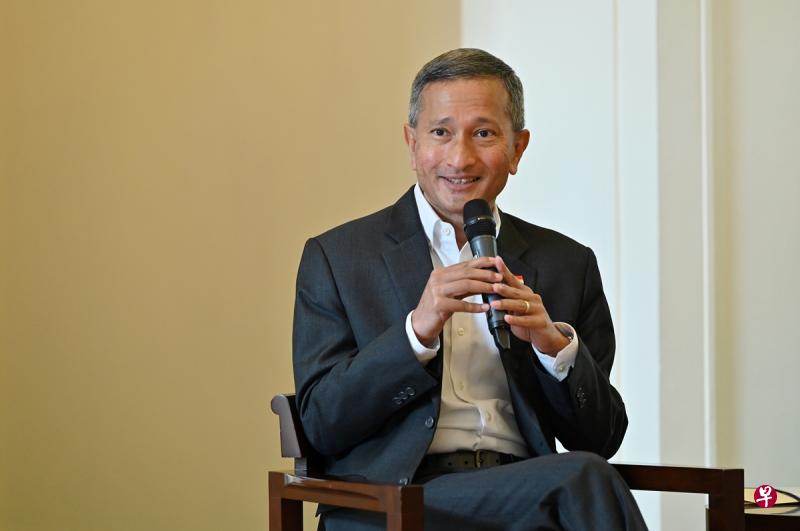
外交部长维文医生日前上澳洲访谈节目时,被问及是否对澳中关系出现波折感到惊讶,他以分享新加坡的经验做出回应。“维系与中国的关系在于保持相关性,有用处却不被利用。这是我们所有人都须要找到的微妙平衡,新加坡找到了。”
新中关系的维系,在于我国通过政府间合作项目等方式,对中国保持相关性,有用处却不被利用。外交部长维文医生说,这是各国须找到的微妙平衡。
由澳大利亚前国防部长派恩(Christopher Pyne)主持的访谈节目《环球焦点》,前天(10月10日)在澳洲天空新闻台(Sky News Australia)播出第一集,邀请到维文担任嘉宾。
根据外交部提供的访谈文本,派恩就澳中目前的紧张关系询问维文,是否对这两个国家的关系出现波折感到惊讶。维文回应时强调,他没有资格告诉澳洲如何施展外交,他能做的只是分享新加坡的经验。
维文说,中国是新加坡最大的贸易伙伴,新加坡自2013年起也是中国最大的外资来源国。“因此,从新加坡的角度,我们有着切身利益,而我们对中国的态度向来是展示我国的相关性。”
他举出三个新中政府间合作项目,即苏州工业园、天津生态城,以及重庆战略性互联互通示范项目。其中,重庆项目下的“国际陆海贸易新通道”,将通过新加坡连接中国西部和东南亚。
维文说:“维系与中国的关系在于保持相关性,有用处却不被利用。这是我们所有人都须要找到的微妙平衡,新加坡找到了。”
他强调,新中关系极佳,中国国务委员兼外长王毅不仅上个月访新,两人过去12个月也面对面会见了约四次。“双方互动水平和节奏向来很高。或许较鲜为人知的是,即使在冠病疫情期间,双方仍在关键时刻彼此低调相助。”
长期关系必生分歧 维文:出现时须解决
维文说,新中关系并不对称,因为新加坡太小了,也不是基于完全一致的立场,因为这不可能,但两国找到合作方式,并在出现分歧时共同解决。
他认为,分歧是任何长期关系不可避免的一部分,必须去处理。“这如同一场每周都有同样玩家围坐一桌的游戏。即使你有分歧也要去解决它,并理解这其中有大的格局和更长远的角度。”
派恩进一步追问,新加坡的做法是不是亚细安国家普遍采取的做法。对此,维文说,亚细安已超越欧盟和美国,成为中国最大的贸易伙伴。
“这种贸易相互依存关系是真实的,并仍在增长。”
就中国的“一带一路”项目而言,东南亚对此的主要兴趣在于投资,尤其是基础设施和连通性方面的投资。可见,双方的中长期利益有明显交集。
因此,尽管中国在南中国海问题上与东南亚声索国存在分歧和争端,但这只是双方广泛关系中的一个面向。维文说:“没有人希望情况失控或破坏关系的长期轨迹。”
他坦言,领土声索可能需要数年乃至数十年才能解决,任何国家都不会轻易放弃,但它不是各国继续往来和建立关系的绝对障碍。这正是东南亚目前的情况。
维文也重申,亚细安坚持维护包容开放的区域架构。这当然牵涉美国。事实上,美国在东南亚的投资额,超过它在印度、中国和韩国的投资总额,因此在本区域拥有切身利益。
“我曾对美国历届政府说:‘你们已经占得先机。美国仍是东南亚最大的外资来源国。美国在本区域的存在受到欢迎且具建设性。不要失去这个领先优势。’”
派恩也问维文,是否认为北京正在制定一个能允许澳中有尊严地走出目前混乱局面的方式。对此,维文说,中国在地缘战略上有长远和开阔的眼光,他相信有这方面的计划,虽不清楚何时发生,但希望两国关系能早日改善。

北美法律公益讲座安排
时间:周二到周五 晚间
5:30-7:00(西部时间)8:30-9:30(东部时间)
周二: 如何准备遗嘱文件(遗嘱workshop)
周三: 数据泄露和个人身份保护&事业机会说明会
周四: 移民和留学生常见法律问题
周五: 小企业常见法律问题&事业机会说明会
Zoom:6045004698,密码:请私信或群里@我

Transcript of Minister for Foreign Affairs Dr Vivian Balakrishnan’s Interview on Sky News Australia’s “Global Focus with Christopher Pyne” on 15 September 2021
10/12/2021
Christopher Pyne (Sky News Australia): Hello, I am Christopher Pyne, and this is “Global Focus” on Sky News Australia. Today, my guest is Vivian Balakrishnan, who is Singapore’s Foreign Minister and a good friend to Australia over a long period of time. Vivian, welcome to the show, and thank you very much for being with us.
Minister: Thank you. Always great to see you. A blast from the past, and we have been up to a lot together.
Pyne: That is definitely true. I am sorry we cannot be together in person. But you know, it would not be too long before we can be again.
Minister: Hope so, hope so.
Pyne: The relationship between Australia and China is clearly strained at the moment, economically and politically. Does it surprise you that the relationship has taken this turn?
Minister: Well, first I would say, I am not really in a position to advise Australia. But what I would say, shared as a perspective from Singapore – this tiny city-state in the heart of Southeast Asia. The biggest success story in the last 40 years really has been China after the reform started by Deng Xiaoping. As a result of that, and especially the last 20 years since they joined the WTO (World Trade Organization), China has become our largest trading partner. But the other surprising fact, perhaps, may be that Singapore is also the largest foreign investor in China, has been since 2013. So, the point is that from a Singapore perspective, we have got skin in the game. And our attitude to China has been to demonstrate relevance. For instance, we have got three Government-to-Government projects. The first one was in Suzhou. It was an industrial park – bring in foreign companies, build manufacturing plants. Second was in Tianjin – that was an eco-city, when this whole thing of sustainable development came about. Our most recent project was in Chongqing – in a sense, part of the BRI (Belt and Road Initiative) but really an attempt to connect Western China and through this new corridor which we call the “Chongqing Connectivity Initiative-New International Land-Sea Trade Corridor”. This corridor links Western China through into Southeast Asia via Singapore. So, it has been about relevance, about being useful, but not being made use of. This is a delicate balance which all of us need to find, and we have been able to find that. Right now, if you were to ask me, I would have to say our relations are excellent. (Chinese) Foreign Minister Wang Yi was just in town. I have seen him personally face-to-face about four times in the last 12 months. The level of interaction, (and) the tempo has been high. Perhaps the lesser-known fact is that even during this COVID pandemic, at critical moments, quietly, both sides have helped each other at critical points in time. So, there is a relationship not based on symmetry – you cannot, because we are so small – not based on complete congruence – it is not possible – but we find ways to work together and where there are differences, we work through them. The point is that you have to treat the issues as they come up – the differences as part and parcel of a longer-term relationship that has to be managed. It is like a game in which the same players are going to be at the table week after week. Even if you have differences, work it out and understand that there is a much larger account and a much longer-term horizon. That is just my take from Singapore. I am in no position to tell Australia how to conduct foreign policy. Julie Bishop and Marise Payne are more than capable of doing this.
Pyne: Yes, indeed. My former House mate in Canberra for 20 years, Marise Payne, would not be appreciative at all of you giving her advice about how to manage our relationships. But she likes you very much.
Minister: She does not need my advice.
Pyne: I know how well you get along.
Minister: We get along perfectly.
Pyne: I have been in some of those meetings of ministers for trade, defence, and foreign affairs, and I know how close you and Marise are. This is a great relationship that we have got.
Minister: Chris, you have been there. You have seen it up close.
Pyne: I had, and (I) enjoyed it too. The approach that you have just outlined that Singapore is taking with China, is that generally the approach of the ASEAN nations? That they all see similarly that they can have a relationship with China, which does not have to exclude others?
Minister: Well, I would characterise the relationship with ASEAN and China along the following dimensions. First, China is now the largest trading partner for virtually all of us. But a more recent development which may not be fully appreciated yet, is that if you ask China who their largest trading partner is, in fact, ASEAN has now overtaken the EU (European Union) and the US (United States). This trade interdependence is real, and it is growing. So that is the first point. The next point is that even if you look in terms of China’s Belt and Road signature project, the key interest of Southeast Asia is investments, and particularly investments in infrastructure, in connectivity, and still there again you see that there is an obvious confluence of interests – medium and long term interests. Are there problems or differences? You know fully well that there are. For instance, in the South China Sea, where there are differences over claims, for each of the Southeast Asian countries with claims – and I would exclude Singapore because we have no claims in the South China Sea – but for each of the claimant states, their differences, their disputes – even if you want to call it that – with China are just one dimension of a much broader relationship, and therefore would be looked at strategically. No one wants them to get out of hand or to disrupt the long-term trajectory of relationships. Now, one final point I would make about ASEAN, is that ASEAN is very insistent on maintaining an inclusive and open regional architecture. This is something which Australia would be familiar with because you know that we have always been advocates, champions for Australia’s economic and political engagement with our part of the world. (The) same thing applies to China. Even as China is our biggest trading partner, even as China is a significant source of investment, and we are key investors into China, we want to keep our region open, inclusive, and that of course relates to the elephant in the room – America, which has in fact, invested more in Southeast Asia than America has invested in India, China, and (Republic of) Korea combined. That is another fact which is not fully appreciated – the amount of skin that America has in Southeast Asia. I used to tell successive administrations: “You have got a head start. You still remain – when I say “you” (I mean) America – the biggest foreign investor in Southeast Asia. You are a welcome, constructive presence. Do not lose the head start. You are welcome.” So, the key word there is inclusivity. We want Southeast Asia to continue to engage with China, with America, with Australia, New Zealand and of course, you have got Japan, (Republic of) Korea, and India, and that in a sense, creates the larger outer arc. Another example of that is the RCEP, the Regional Comprehensive Economic Partnership. The only one that could not get onto and sign was India. But for 15 countries – and the combined economy is a huge big chunk – to get on this platform, and to get on at a time when there is a pushback globally against free trade and economy integration, makes it all the more significant. So I would say it is a big, deep, and evolving account. But Australia is part of this account too, and that is important to emphasise, especially back home for you.
Pyne: Yes. Well, it is interesting because here in Australia, the media commentary is very much the only issue that people talk about is the tension between China and the rest of the nations in the Indo Pacific, and the South China Sea is, as you know, often used as the primary example of tension. But what you are saying, if I could paraphrase, is that the countries like the Philippines, Vietnam, Brunei, Indonesia, Malaysia, (and) others that have claims over the South China Sea, see that as just one part of a multi-faceted relationship with, what is clearly the largest economy in the region, and 1.3 billion people who are not suddenly going to go away. So, managing that relationship and that South China Sea tension is just another thing to discuss, as opposed to becoming the most important part of the relationship.
Minister: It is a long-term game. You are not dealing with an adversary, (and) you do not want to make them (an) adversary. But it is a stakeholder. You will have differences, and there will be divergence. The question is, can you resolve it? Even if you cannot (right) now – frankly territorial claims are very difficult to resolve; it may take years, decades even, and no country is going to walk away from claims lightly. But it does not have to be an absolute block to ongoing engagement and (the) building (of) those relationships. So that is really what is happening in Southeast Asia.
Pyne: Do you think that there is a party, and you cannot also comment on foreign policy out of Beijing, but would it surprise you if there was not a group in Beijing formulating, now, a dignified exit for both Australia and China out of the current imbroglio that we find ourselves in?
Minister: China thinks long term and takes a wide view in geo-strategy. I am sure there would be a paper somewhere in a drawer on what happens when we press the green button and say, the sun is out and it is (a) good day mate. When that will happen? I do not know. But I hope it happens soon.
Pyne: Yeah, me too. Well, Vivian that has been great. We have to go to a break now, but Sky News Australia will come back after the break and continue our conversation. It might switch to the role of the US in the Indo Pacific. So, thank you very much so far, and we look forward to talking to you again in a couple of minutes.
Christopher Pyne (Sky News Australia): Welcome back to Global Focus here on Sky News Australia. My guest today is Vivian Balakrishnan, Singaporean Foreign Minister. We have been talking about ASEAN, Singapore, Australia, the role of China in our region, and now we will shift to the other great superpower in the Indo Pacific, which is the US. Vivian, the Afghanistan war has effectively come to an end, Taliban is back in power in Kabul after 20 years. I know you cannot speak for all of ASEAN, but you can speak for the Singaporean Government. Is it your view and Singapore’s that this is the combination of the US completing its mission and now extricating itself from a very difficult conflict or is it being seen as a significant defeat for the US, which is going to take many years to recover from in terms of their prestige in the Indo Pacific region?
Minister: That is a profound question. Actually, both Australia and Singapore, and you would be familiar with this, were part of the International Security Assistance Force (ISAF) in Afghanistan. Why did America go in? And why was Australia and even Singapore part of the ISAF? It was because of terrorism. In fact, more specifically because of 9/11. In Singapore’s case, we even discovered a local terrorist cell. Fortunately, we discovered it before they could actually take any action. But even this local homegrown cell had links with Al-Qaeda. So we fully understand why in the aftermath of 9/11, America had to go in (to Afghanistan). The question then is, is this threat from terrorism resolved? The answer is that it is certainly acute. (The) immediate threat 20 years ago was settled, but the nature of terrorism has now metastasised and (is) turbocharged with internet technologies. In fact, the risk has gone up, not gone down. But really, if you think, and here we put ourselves in the Biden Administration’s shoes, the truth is they inherited a very difficult situation. Actually, they are not the first Administration to want to come out of Afghanistan. So, they were in a difficult pickle and I think you, as a former Defence Minister will know as well as I do, there is no easy, neat, tidy way to get out of a sticky situation like that. So, we understand why they had to get out. Of course, everyone wishes it was done more elegantly, but that is more easily said than done. We hope Afghanistan will not become another haven for terrorists again. But we have no illusions; I think both in Australia and in Southeast Asia, we have got homegrown terrorists. We have got terrorists in our own region. The question is whether they will be activated or at least enthused by current events in Afghanistan to try their luck. So, we will have to be vigilant. That is what confronts us. As far as the people in Afghanistan is concerned, I think there is an emerging humanitarian disaster. We hope that the Taliban leaders – you know, 20 years is a new generation – we hope that they will take good care of their own people. We hope that they will also build functional relationships with their neighbours and the rest of the world, but time will tell. In the end, I think the other point is that Afghanistan has always been the graveyard of empires. The British discovered it, the Russians re-learnt it. It looks like America’s nation building effort there has been another footnote in history of this recurring pattern. So, there we have it – a difficult situation. We have great sympathy for the Biden Administration.
Pyne: It will be very interesting to see if the new model for combating terrorism is similar to what happened in the Philippines a few years ago when the Australian government, the defence forces provided intelligence (and) surveillance support for the Philippines military in addressing the ISIS conflicts that occurred in the Philippines, and you would be familiar with that. ASEAN nations gave their support to the Philippine government, which was a much more clinical and specific engagement, as opposed to what happened in Afghanistan which was something like 25 different nations joining the coalition and whether we learned our lesson from that particular conflict. And of course, your point you made previously is a good one – the Biden Administration came to the Afghanistan conflict at the end. The Obama Administration announced the drawing down on forces almost 10 years ago. Of course, the Trump Administration announced that they were leaving and allowed 5,000 Afghan, Taliban fighters to be free. So, nobody comes to this, what appears to have been something of a fiasco, with entirely clean hands.
Minister: It is a messy situation. You mentioned the Southern Philippines, Marawi. There are no neat surgical operations. When there is a terrorist attack, it is not just a military operation. You also have to deal with the hearts and minds of the people. The solution, ultimately, lies locally. That is where the battlefront really is. It shows the limit of external intervention. To assume that we can do this remotely without leadership and resolve on the ground, locally – that is just a bridge too far. At least within Southeast Asia, I think all the governments are focused on this. We have got good counterintelligence operation information sharing. Australia has also been a critical part of this. You would know from your previous life. Like I said, we are just going to have to deal with it and to get on with it, and to know that this is a clear and present danger.
Pyne: Definitely. The Biden Administration, I think will be quite different to the Trump Administration in managing of the Indo-Pacific (and) China, and its superpower status. How do you see the Biden Administration in its early days, certainly being just over half a year? Here in Australia, we see it very much as a return to a more consistent and probably predictable response to issues. How has Singapore and the ASEAN nations in general, seen the Biden approach to the Indo-Pacific and particularly, he has made the Quad quite preeminent in his and his Secretary of State’s views about American foreign policy. How do you see that all playing out in the next three years?
Minister: Well, I share your view that at least in terms of style, in terms of the personalities involved, this is a return to a more conventional establishment, a more conventional way of operating the State Department. (US Secretary of State) Antony Blinken and the others, including (US National Security Advisor) Jake Sullivan, are not strangers to Australia and Asia. So that is familiar. You are on familiar ground. But I would say that the real question for us in Southeast Asia is that trade and investment is strategy. The fact that the US, having been a key locomotive for the CPTPP (Comprehensive and Progressive Agreement for Trans-Pacific Partnership), at the end of the day had to walk away from it – and mind you this is not because of the Biden Administration, – it is not just President Trump, but even candidate Hillary Clinton, the former Secretary of State, in her campaign also had to back away from the TPP (Trans-Pacific Partnership). Now, I know this is because of domestic pressures, the polarisation and the division in the American body politic. Frankly, America cannot come to the table until it resolves its internal situation, achieves unity of purpose, (and) achieves confidence to engage in this. But herein lies the apparent contradiction, because if you look at the past seven decades, the spectacular growth in Southeast Asia and the equally spectacular, uninterrupted growth of Australia, a key reason for that has been the US presence here, (and) its investments in our economy – and I already told you, America is more invested here (Southeast Asia) than it is in India, China, and (Republic of) Korea combined. I am sorry I do not have the figure for Australia, but I am sure it is a very big number. And not just money – access to technology, access to markets, becoming part of global supply chains with multinational corporations, this belief that free trade, properly negotiated free trade agreements, norms, rules and regulations, create a fertile environment for peace and prosperity. So I think we are all missing a key architect of that architecture and we have left the door open, certainly in terms of the CPTPP, for America to come back. I think both Australia and Singapore certainly hope America comes back. But in the meantime, while America is out, what has happened? The RCEP was signed last year. In fact, China and Singapore were the first two countries to ratify the RCEP. Now, China has also told us that they are interested in exploring and becoming part of the CPTPP. Of course, so has the UK (United Kingdom). And again, coming from a city-state that believes in free trade because, after all, trade is more than three times (Singapore’s) GDP, we have to welcome such overtures. The point is that all these big things are happening, and America does need to work out its strategy, and understand that the game in Southeast Asia is trade and investments. So that is what we are waiting for. I would not lose hope. I will continue to make that point, and to also remind America that the door remains open, and that you (America) have a head start. Do not miss out. Because after all, the real growth is in the Pacific, and America is a Pacific power. That is my elevator pitch to them.
Pyne: I think it is a good point you make. It is a good point you make, and the truth is Australia, Japan, and Singapore – when the Trump Administration withdrew from the TPP – we made it clear that we believe strongly in it, and that we would keep going with it, which I think was very important. Well Vivian, we could talk all evening and we have got lots more questions I could ask you, but we have run out of time. So, can I thank you very much for coming on Global Focus. It is great to see you again and I look forward to seeing you in person. And I send also Julie Bishop’s best wishes, who I was speaking with today.
Minister: Please tell her I miss her too. Great seeing you, thank you.
李光耀谈阿富汗问题讲了什么?
文 / 联合早报网
8/20/2021
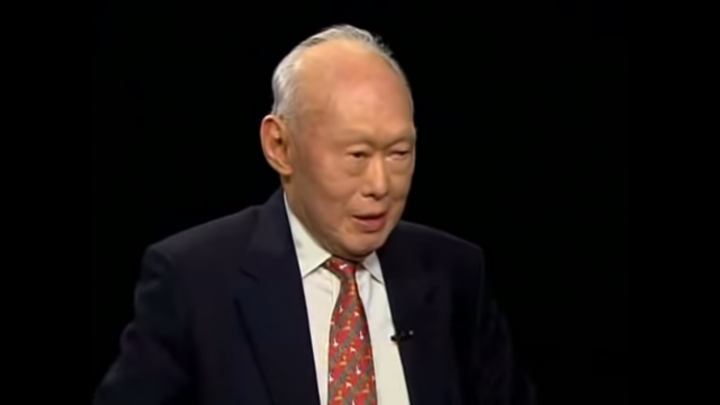
美国从阿富汗撤军没多久,扶植的政权迅速崩塌,以伊斯兰原教旨主义运动与恐怖主义活动起家的塔利班重新上台,山姆大叔投入了20年的资源和心血一夜间付诸东流……
这几天,一些网站上载了新加坡已故建国总理李光耀2009年10月接受美国著名电视记者、谈话节目主持人查理·罗斯(Charlie Rose)专访时谈及阿富汗问题的视频片段,有的中国网站的标题更称其为“神预言”。
首先要交代一下背景。美国是在2001年九一一事件后进军阿富汗,两个月间就推翻了被指为九一一事件主谋基地组织提供庇护的塔利班政权。2002至2008年,美国一方面继续与塔利班在军事上缠斗,另一方面则致力重建阿富汗国家核心机构。到了2009年,美国总统奥巴马增加在阿富汗的驻军,以实施一项保护民众免受塔利班袭击并支持叛乱分子重新融入社会的战略,同时也定下从2011年起逐步将安全责任移交给阿富汗军警并撤军的计划。但上述战略和计划都不甚成功,美国与北约的作战任务直至2014年12月才算正式结束。
李光耀2009年接受查理·罗斯专访时,正是美军加大投入阿富汗战争之际。
至于是怎么“神”呢,就来看看整理自视频的问答录:
查理·罗斯:当您审视美国与其对外关系,还有它对石油和中东政治的关注时,您是否认为这是一种分心?你认为……
李光耀:不,我不是说中东会让人分心。我认为试图在阿富汗打造出一个国家来是一种分心。在过去三四十年来,那里根本没有国家可言,末代国王被赶出去后就内战不止。
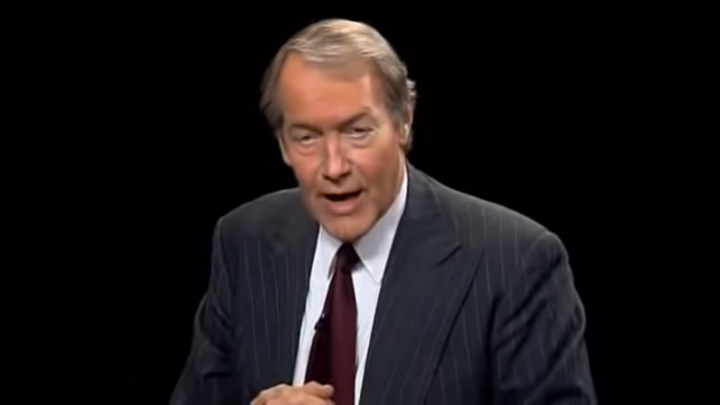
查理·罗斯:对。
李光耀:你们到底要怎么把这些小碎片拼在一起?这是不可能的。
查理·罗斯:所以,要怎么做?
李光耀:我不是专家,但我觉得你们在阿富汗获胜不是因为跟塔利班作战,而是因为你们让北方联盟与塔利班作战,并为北方联盟提供了情报和轰炸、瞄准塔利班的能力,以致他们成功取下南方。
查理·罗斯:是的,但他们在那里也面对治理问题。
李光耀:没错,但那是他们的问题,你们为什么要把它变成你们的问题?
查理·罗斯:那怎么办?你会撤出所有的军队,任由阿富汗发生的事情发生吗?反正他们对美国没有那么大的威胁,是这个论点吗?
李光耀:我不知道,因为我认为再怎么难,也难不过美国让他们的军队被困在那里了。苏联军队冷酷无情,他们中有12万人在那里,但也不得不离开。
查理·罗斯:我们帮了一点忙,因为我们支持了圣战者组织。他们得到了来自世界各地的很多支持,因为后者希望看到苏联挨打。
李光耀:但不管苏联人是否帮助他们把美国人赶出去,我认为……北约成员国对结果非常怀疑。
查理·罗斯:甚至到了不想将军队派往某些战区的地步。
李光耀:没错。是的,当然,因为那样你就会白白被枪杀。
查理·罗斯:但那些争论阿富汗是否被离弃的人首先会说,你看,苏联撤军后你曾经离弃过一次阿富汗,现在你又要离开了。美国必须坚持某些事情,并且必须对外展示它已准备好留下来。你完全不认同吗?
李光耀:不。
查理·罗斯:那你一定和你的朋友基辛格聊得很开心吧?
李光耀:不,不。
Aug 18, 2021
查理·罗斯:对于美国在世界上的角色,你和基辛格的看法有何不同?
李光耀:我不觉得我们有任何区别。
查理·罗斯:是吗?那你怎么定义呢?
李光耀:我认为美国可以成为世界秩序的良性稳定器,没有美国,东亚当初就不会增长,你们带来了和平与技术、贸易和投资,东亚因此繁荣昌盛。
查理·罗斯:很明显,东亚发生了这种情况,你说的是新加坡和韩国。我们如何在中东做到这一点?当我们发生这样的冲突时,你要怎么做到这点?
李光耀:(笑)你不能解决世界上所有的问题。
据新加坡时政网站慈母舰(Mothership)报道,除了上述专访,李光耀2008年2月2日接受合众国际社采访时,也曾谈及阿富汗问题,他在这次访问中的谈话比较坦率,并提出部分解决方案。
李光耀说,如果美国给困在阿富汗,不应尝试做太多事情,而是让军阀之间去解决,条件是他们不会去建立一个新的塔利班国家。
他认为,要改造一个社会,是超出了任何国家的能力,以美国当年攻打伊拉克为例,应该快进快出,进去了只要委任继任者就完事了,并警告说“如果你表现得像(倒台的伊拉克前总统)萨达姆,我就会回来”,那就够了。
美前高官傅立民:美正与中国打着注定会输的比赛
5/10/2021
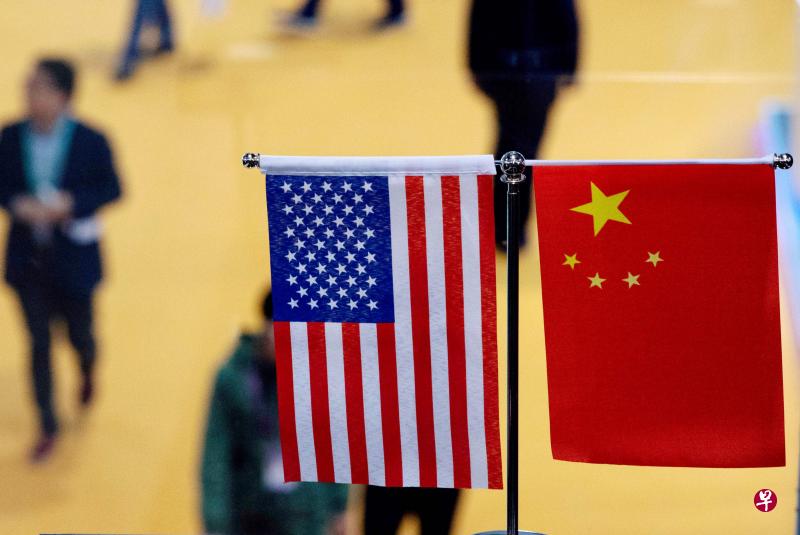
美国前资深外交官、前助理国防部长傅立民(Chas W Freeman Jr)批评美国政府的对华政策“自欺欺人”(self-defeating),指华盛顿正在打一场注定会输的对华比赛。
傅立民周日发表在澳洲亚太事务研究网站东亚论坛( East Asia Forum)上发发表题为《华盛顿正在打一场注定会输的对华比赛(Washington is playing a losing game with China)的文章,指美国应在全球性问题上加强与中国的合作,如果继续选择与中国对抗,只会在国际社会上失道寡助。
他认为目前的美中关系,凸显了弗里曼的战略动力学第三定律(Freeman’s third law of strategic dynamics),即每一次敌对行为都会引来更加敌对的反应。
文章指华盛顿发起贸易战,只是因为对中国超越美国的潜力感到担忧,并试图通过不断升级的“极限施压”来削弱、遏制中国。
他说,在国际象棋中,美国就是一个很容易被识别的选手:除了激进的开局外,没有其他的战略。
傅立民在文中以数据证明,美国老百姓深受政府发起贸易战的伤害。他指出,美国农民失去了价值240亿美元(318亿新元)的大部分中国市场;美国公司利润降低,转而削减员工工资和工作岗位、推迟加薪,并提高美国消费品的价格;据估计,美国损失了24.5万个就业岗位,同时减少了约3200亿美元的国内生产总值(GDP),美国家庭平均每年要多花1277美元购买消费品;预计到2025年,美国将失去32万个工作岗位,GDP将比预期的低1.6万亿美元。
文章指出,在另一边,中国正稳步前进。2020年,中国总体贸易顺差达到5350亿美元,再创新高;与此同时,中国正通过降低贸易壁垒、与美国以外的国家达成自由贸易协议、发起贸易争端解决机制等方法,提高了自己的地位。
此外,傅立民还称,中国给美国带来的挑战主要是经济和技术上的,并不是军事上的。但现实是,“美国的飞机和战舰总在中国边界周围活动,中国的飞机和战舰并没有在美国的海岸外巡逻;中国周围到处是美军基地,而美国附近却没有中国的基地”。
傅立民强调:“如果美国继续选择对抗,只会发现自己越来越孤立。如果美国对华政策被定义为一种道德努力,大多数其他国家将选择远离,而不是被吸引”。他指出,各国想要的是获得多边支持来应对挑战,而不是美国的单边对抗;希望在主权最大化的条件下容纳中国,而不是让中国成为敌人。
傅立民认为,除对抗无益外,中美两国合作还有许多必然性。首先,在美国国内,没有中国的参与,市场投资、供应链等很多问题都无法解决;其次,在国际上,两国应合作改革全球治理,解决共同关心的全球性问题,如环境恶化、流行病、核武器扩散、全球经济和金融不稳定、全球贫困等等,并为新技术制定标准。
在文章最后,傅立民强调,“为了在与中国(竞争中)保持优势,美国必须提升竞争力,建设一个治理更好、教育更好、更平等、更开放、更创新、更健康和更自由的社会”。他断言,显然对抗不是通往这一美好愿景的方式,合作才是。
傅立民目前是美国布朗大学沃森国际与公共事务研究所访问学者,曾作为美国前总统尼克逊的首席中文翻译陪同访华,之后他先后在国务院主管中国事务、担任美国驻华公使和负责国际安全事务的助理国防部长。
陆克文斥莫里森草率介入台海议题幼稚
5/10/2021

在中澳关系持续恶化的背景下,澳大利亚前总理陆克文撰文批评,莫里森政府最近声称若台海爆发战争,澳洲将支援美国等盟友的有关言论,“在政治上是幼稚的”(politically juvenile),可能损害澳洲核心国家安全利益。
莫里森上周接受澳洲3AW电台的访问时说,澳洲政府对台政策将坚定不变,若中国大陆武力进攻台湾,澳洲将会履行支援美国及盟友的承诺。
对此,陆克文前天(8日)在《悉尼先驱晨报》发表署名文章称,莫里森政府最近对澳洲军事介入未来美中对台湾战争的可能性所发表的草率评论,在政治上是幼稚的,可能损害澳洲核心国家安全利益。
文章说,50年来,澳洲历届政府都没有在台海冲突的课题上,公开猜测澳洲会怎么做,但在过去两周,总理莫里森、国防部长达顿,以及内政部秘书长佩祖洛,都严重违反了这一澳洲两党共识。
陆克文在文章中指出,澳洲政府此前有充分理由对潜在的台湾军事方案保持沉默(tight-lipped),因为该冲突将涉及中美两个世界上最大的军事力量,并有可能成为自1945年以来亚洲最暴力和最具破坏性的战争。因此,澳洲现阶段不应该损害国家决策的独立性和灵活性。
文章也说,澳洲官员一直周旋在华盛顿、北京和台北之间,竭尽全力防止此类战争发生。面对美国,澳洲官员要同美国一道,确保美国在亚太地区的军事威慑力,以此对中国大陆产生遏制效果;面对中国大陆,澳洲官员则进行游说,试图让北京相信美国会武装介入台海冲突;而面对台湾,澳洲官员要试图阻止台湾单方面宣布“台独”(或采取走向“台独”的步骤),因为这将越过北京最基本的红线。
文章接着称,莫里森政府在台湾问题上像不成熟地捶胸示强(adolescent chest-thumping),不仅让美国人感到困惑,让大陆民众感到愤怒,让台湾百姓不解,也让亚太地区其他国家感到迷惑。
陆克文随后在文章中质问,为什么莫里森、达顿等要在台湾问题上,公开发出“红色警报”信号?难以想象(inconceivable)澳洲的国家安全机构会建议他们这样做,因为这不符合国家利益。“事实上,这在战略上将适得其反。”
陆克文在文中指出,目前澳洲疫苗和检疫程序一团糟、债务和赤字居高不下、执政党自由党内歧视女性问题严重,莫里森政府此时发表草率涉台言论唯一可能的动机是想转移国内视线,以获得多数支持赢得选举。对自由党来说,把工党打成“亲共”是最好的伪装。
文章称,坎培拉还有一个最广为人知的秘密:达顿和莫里森之间存在未公开的领导权之争。达顿认为,在自由党内部,中国议题是击败莫里森的最佳工具。这是可耻的,纯粹为了政治私利,用澳洲核心国家经济和安全利益做赌注。
陆克文最后在文中说,中国日益增长的实力以及特朗普政府的失败,让莫里森政府难以处理澳中关系。面对复杂的挑战,澳洲领导者需要有明智、冷静和慎重的判断,国家安全不是政治游戏。然而,莫里森和达顿过去两周的表现无疑表明,面对复杂的国家安全性势,这届澳洲政府缺乏应对挑战的勇气。




